SUSTAINABLE DEVELOPMENT GOALS REPORT
2021-2022
 The Hong Kong Polytechnic University supports the Sustainable Development Goals
The Hong Kong Polytechnic University supports the Sustainable Development Goals
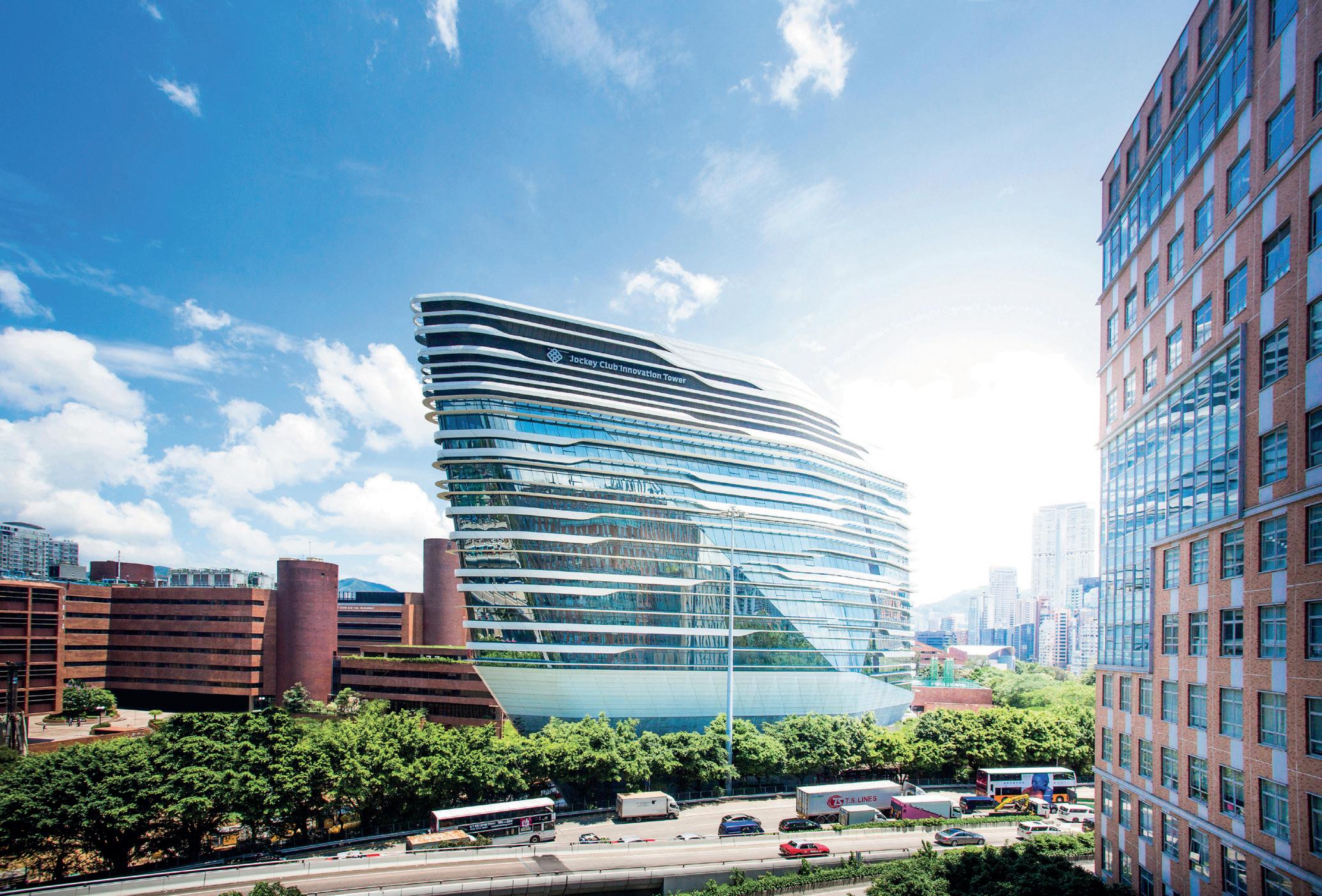
Universities must respond to the United Nations’ call to action and help urgently address the critical challenges and opportunities our world faces.
The United Nations (UN) Sustainable Development Goals (SDGs) provide a crucial framework to address the world’s most pressing challenges and shape a better tomorrow. As an innovative world-class university with a strong sense of social responsibility, The Hong Kong Polytechnic University (PolyU) is dedicated to leveraging its educational, research and knowledge transfer excellence to contribute to the UN SDGs, as well as related objectives such as our country’s commitment to achieving carbon neutrality and Hong Kong’s Climate Action Plan 2050 with its vision of “Zero-carbon Emissions • Liveable City • Sustainable Development”.
For example, we have established the PolyU Academy for Interdisciplinary Research, also known as PAIR, which is conducting mission-driven frontier research in various areas of socioeconomic importance, including smart cities, carbon-neutral development, new energy technology, artificial intelligence, advanced manufacturing, food technology, mental health, and more. The outcomes of PAIR’s research efforts are contributing towards the realisation of numerous UN SDGs.
Meanwhile, our award-winning Service-Learning initiative, which encourages students to use their knowledge to serve communities in need in Hong Kong, Mainland China, and beyond, provides a diverse range of programmes that are aligned with the UN SDGs and are helping to foster the next generation of socially responsible leaders dedicated to bringing about a better world.
Last but not least, we will contribute to the UN SDGs through our strategic plan to attain campus carbon neutrality by 2045. We have established the Campus Carbon Neutrality Committee to develop a University Roadmap outlining policies and operations to reach this objective.
This report will highlight many more important ways in which we are making contributions to the UN SDGs, living up to our University motto, “To learn and to apply, for the benefit of mankind”. We hope that our affirmative stories not only illuminate some of the actions PolyU is taking to address urgent global challenges, but can also inspire other institutions in the public, private, policy and education sectors to work together to generate innovative ways to foster a better future for our planet.
Professor Jin-Guang Teng, JP President
Goal 1: No Poverty
Goal 2: Zero Hunger
Goal 3: Good Health and Well-Being
Goal 4: Quality Education
Goal 5: Gender Equality
Goal 6: Clean Water and Sanitation
Goal 7: Affordable and Clean Energy
Goal 8: Decent Work and Economic Growth
Goal 9: Industry, Innovation and Infrastructure
Goal 10: Reduced Inequalities
Goal 11: Sustainable Cities and Communities
Goal 12: Responsible Consumption and Production
Goal 13: Climate Action
Goal 14: Life below Water
Goal 15: Life on Land
Goal 16: Peace, Justice and Strong Institutions
Goal 17: Partnerships for the Goals
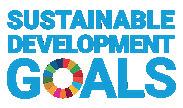
CONTENTS
01 03 05 09 11 13 15 17 19 23 25 27 29 31 33 35 37
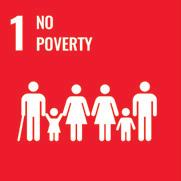
Research
NO POVERTY
Impact of Child Development Fund (CDF) Programme on Poverty Reduction
The government-initiated CDF programme is aimed to promote the long-term development of children from families receiving government subsidy and to reduce intergenerational poverty. The programme has three components: establishment of personal development plans, participation in mentorship programme, and cultivation of targeted saving habits.
In a survey led by Professor Edward K. L. Chan, Chair Professor of Child and Family Welfare at the Department of Applied Social Sciences, the long-term effects of CDF programme on participating children were examined. The study revealed that CDF participants reported a significant amount of monthly savings. A considerable number of families of the CDF participants were no longer reliant on financial assistance from the government. As such, the programme was found to be effective in assisting children in poverty from adolescence to young adulthood.
Education
Subject: Understanding Children in Poverty in Hong Kong
Hosted by the Department of Applied Social Sciences, this subject aims to nurture students’ awareness of poverty issues and enhance their interpersonal communication skills. By engaging in direct volunteering activities and home visits and reviewing research studies, students gain a deeper understanding of the challenges and struggles faced by those living in poverty, including discrimination, marginalisation and structured inequalities. This understanding can help students develop empathy and social responsibility, leading them to a greater appreciation of the roles and responsibilities of citizens in addressing poverty-related issues.
Subject: Financial Literacy for Low-Income Youth in Hong Kong
This subject is hosted by the School of Accounting and Finance. Apart from attending lectures, students provide voluntary teaching in schools or non-governmental organisations (NGOs) on the topic of financial literacy or work with a young person from a low-income family to collaboratively formulate a plan in relation to financial literary. Students also assist a mentor who guides a child under the CDF.
Engagement
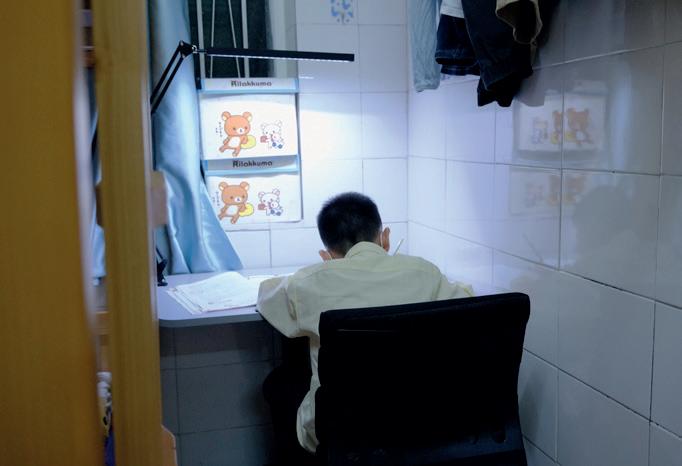
Health-Focused Adaptive Furniture for Underprivileged Children
Leveraging ideas generated by the PolyU Jockey Club “Operation SoInno” Programme and incorporating interdisciplinary research inputs from the School of Optometry and the Department of Biomedical Engineering, the Jockey Club Design Institute for Social Innovation has joined forces with the PolyU School of Design and Technological and Higher Education Institute of Hong Kong to explore furniture designs that improve the study environment, health and well-being of children residing in subdivided units. With support from the Hongkong Land HOME FUND, scalable production solutions have been developed for an ergonomically designed, sustainable, movable and adjustable furniture set for 2,000 children living in very constrained spaces, in order to improve their well-being, support healthy development and improve upward mobility.
Understanding Low-Income Elders who Live Alone or with a Spouse
A team led by Dr Crystal Kwan, Assistant Professor of the Department of Applied Social Sciences, has been
collaborating with the Hong Kong Church Network for the Poor (HKCNP) to study issues faced by low-income elders who live alone or with their spouse.
In June 2022, in collaboration with HKCNP, the team co-organised a research seminar “Understanding Low-Income Elders who Live Alone or with a Spouse Only: Their Voices”. Issues faced by elders were reported on and participants were invited to share their experiences, thoughts and perspectives of being with the elderly, and to discuss possible solutions to the issues and identify services needed.
PolyU Students as Literacy Tutors for Primary School Children

Offering education and community engagement initiatives serving local communities, the English Language Centre collaborates with local NGOs, including the Tung Wah Group of Hospitals, in offering senior citizens a “Practical English for the Elderly” course, focusing on conversation and building confidence. The Centre also provides consultancy for language programmes hosted by Po Leung Kuk and Hong Kong Rugby Union, which enhance the English proficiency of students from underprivileged backgrounds.
01
Policies and Operations
Financial Assistance and Scholarships
With funds donated by philanthropists, the Student Affairs Office administers a number of bursaries and interest-free loans, which aim to support local students who do not receive full study grants from government funding. The bursaries range from HK$3,000 to HK$10,000 while the loans range from HK$10,000 to HK$20,000.
Private organisations, professional bodies and individuals also donate scholarships and prizes which are awarded to students with outstanding academic and/or non-academic achievements (such as achievements in extracurricular activities and community services) during their studies at PolyU.

Library Study Spaces for Learning and Research
The PolyU Library provides a comfortable and inviting environment for learning and research. Various types of study spaces are available to support students’ individual and group learning needs, including Quiet Study Areas, Group Study Areas, Online Meeting Rooms and Group Rooms. Outside normal Library opening hours, students may visit the 24-Hour Study Centre.
No. of students having received a scholarship covering a minimum of 50% of their tuition fees:
No. of students having received a scholarship covering 100% of their tuition fees:
659
437

Scholarly Output
3.73
1,814 Citation Count
02
FWCI
142
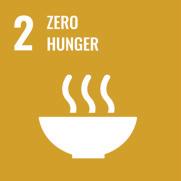
Research
Soil-Care Hospitality
ZERO HUNGER
Established in 2022 with a funding of HK$600,000, SoilFeeder is a food waste upcycling social pilot where the School of Design partnered with Zero Foodprint Asia Foundation and collaborated with Hyatt Centric Hotel. Pioneering cross-sectoral innovation and collaboration between Hong Kong’s hospitality and agriculture industries, it aims to improve education in the hospitality industry on feasible and circular food waste solutions, innovate farm management practices, support local farmers and strengthen Hong Kong’s food security. From recovered organic waste, 1,500kg of organic crops and edible flowers were produced, generating a total market value of HK$150,000, approximately one-half of which was donated to food assistance programmes for families in need.
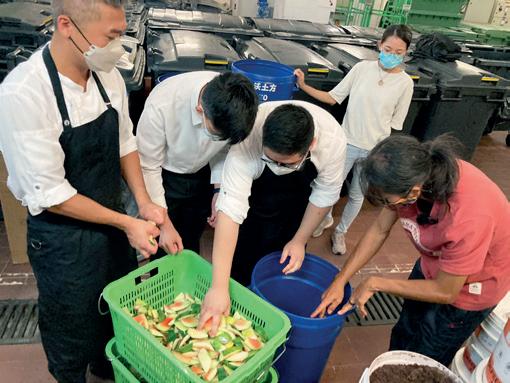
Family-Centred Psychosocial-Based Nutrition Intervention in Patients with Advanced Cancer
Malnutrition in advanced cancer patients is common, while limited and inconclusive data exists on the effectiveness of nutrition interventions. In the research led by Professor Alex Molassiotis, former Head of the School of Nursing, the feasibility of a novel family-based nutritional psychosocial intervention was preliminarily assessed by conducting a randomised controlled trial.
The intervention provided two to three hours of dietitian contact time with patients and family members over a four-to-six-week period, during which nutritional and eating-related concerns were addressed. The intervention has demonstrated the potential to have positive effects on patients’ nutritional status and eating-related distress, warranting a larger trial to ascertain its true effectiveness.
Education
Examining Food Sustainability within Service-Learning Subjects
PolyU teaches food sustainability and addresses hunger issues in two service-learning subjects offered by the Department of Applied Biology and Chemical Technology. The subject “Educating Rural Farmers on Healthier Food Production” trains students to help farming communities in Mainland China and Hong Kong. With the knowledge and skills acquired in class, students communicate with the farmers and support them in improving agricultural production and enhancing productivity, efficiency and sustainability. In the 2021/22 academic year, 157 students served around 70 farmers in Sichuan and Hong Kong in an online/hybrid mode.
Another subject “Service-Learning in Nutrition and Healthy Diet” allows students to deliver health promotion to underprivileged families in Hong Kong to strengthen their nutrition knowledge and help combat hunger. In the 2021/22 academic year, 69 students served 116 families through online family visit and workshop.

03
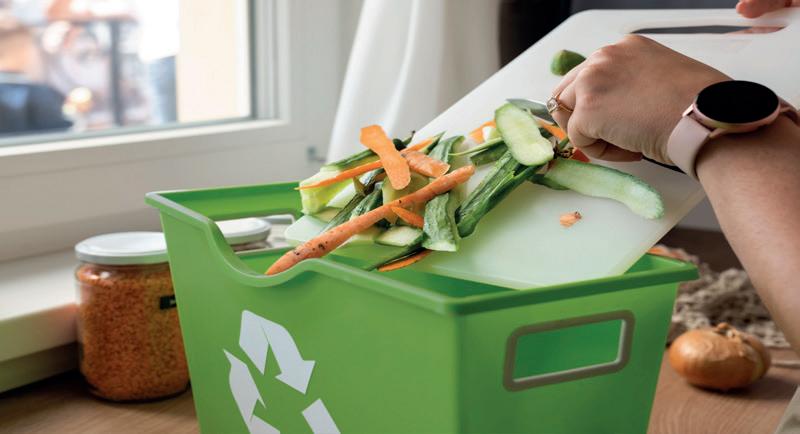
Policies and Operations
Reducing Food Waste on Campus
PolyU is working to reduce food waste at all levels. In addition to introducing a waste management policy that explains the principles and proper practices of waste handling, the University educates the campus community on tackling food waste through publicity channels, training sessions and other activities. Signage is also displayed in catering outlets for reminding diners to reduce food waste. “Guidelines for Green Promotion and Campus Activities” also set out to remind colleagues to plan ahead to minimise wastage, recover leftovers, serve organic, locally produced food and beverages as far as practicable, and discard leftovers for food waste recycling if disposal is unavoidable.
Healthy
and Affordable Food Choices on Campus
The University campus offers a diverse range of dining options with various catering outlets, providing seating for approximately 2,700 and offering an array of Asian and Western cuisines to suit diverse needs within the University community. The canteens, cafes and kiosks provide students and staff with fast, low-priced and yet nutritious meals.
Engagement
1st International Conference on Food Waste to Food Sustainability
Held in 2022 and hosted by the Research Institute for Future Food, the conference attracted over 500 academics and experts from 25 countries and regions, aiming at promoting sustainable food practices and addressing world hunger and food insecurity. It enabled the exchange of cutting-edge knowledge and experience regarding innovative methods for upcycling food waste; development of sustainable and eco-friendly food production; emerging food risks detection techniques; and development of smart technology for functional health-improving food.
Scholarly Output

4.73 FWCI
7,849 Citation Count
04
131

Research
GOOD HEALTH AND WELL-BEING
Genome Sequencing Helps Limit Spread of COVID-19
Professor Gilman Siu, Professor of the Department of Health Technology and Informatics, and his team have used whole viral genome sequencing of the COVID-19 virus to successfully identify the source of the super-spreader event and highlighted that asymptomatic carriers of SARS-CoV-2 could trigger community outbreaks. Their findings have provided scientific support for the implementation of effective anti-pandemic measures by the Hong Kong Government and helped to close loopholes.
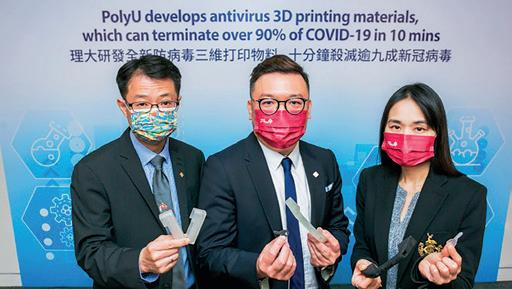
World’s First Antivirus 3D Printing Material
An interdisciplinary research team led by Professor Chris Lo Kwan-yu, Professor of the School of Fashion and Textiles, has developed the world’s first antivirus 3D printing material that can kill the COVID-19 virus. With the use of 3D printing, materials can be produced in different forms. As a result, they are highly flexible and can be used extensively in public facilities to provide epidemic prevention support to the community.
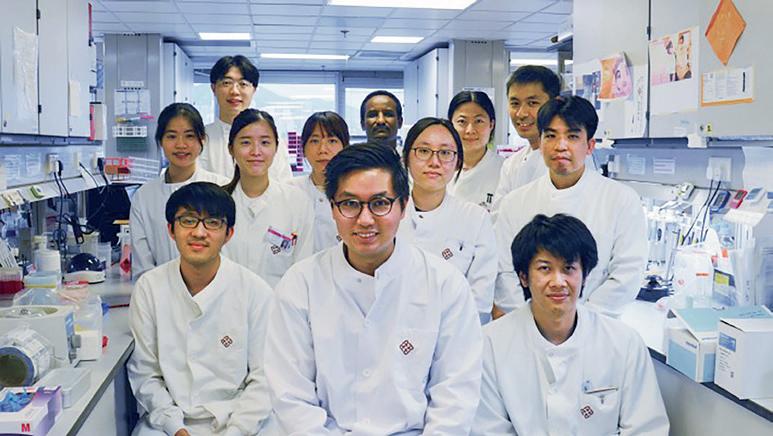

AI-Empowered Chest X-Ray and CT
Quantitative Analysis for COVID-19 Patient Management
Professor Jing Cai, Associate Dean of the Faculty of Health and Social Sciences and Professor of the Department of Health Technology and Informatics, has won a prestigious global innovation award in the areas of artificial intelligence (AI) at TechConnect World Innovation Conference and Expo 2022 with his development of an AI-empowered chest X-ray and CT quantitative analysis for COVID-19 patient management.
His AI-enhanced techniques for COVID-19 clinical applications provide accurate and low-cost imaging solutions for COVID-19 diagnosis, severity estimation and prognosis. These applications include chest X-ray imaging, COVID-19 disease segmentation and multiview analysis. Their ease of access will particularly benefit developing countries that lack the resources to accurately diagnose and monitor COVID-19.
Ultrasensitive, Portable COVID-19 Antibody Test
A research team led by Professor Yan Feng, Associate Director of the Research Institute for Intelligent Wearable Systems, Chair Professor of Organic Electronics at the Department of Applied Physics has developed an ultrasensitive and portable COVID-19 antibody detection sensor based on organic electrochemical transistors. Fast and easy to use, the sensor is designed for testing the antibody levels of people who have either received vaccination or have been infected with the virus. The whole detection process, which uses a saliva sample, takes less than six minutes and the cost per test is as low as approximately HK$10. The antibody detection sensor can test the concentration of antibodies from lower than 10fM to higher than 100nM
05
Research
Jockey Club Smart Ageing Hub
Aiming to promote new gerontechnologies and improve the service quality of residential care for the elderly, this five-year PolyU project, led by Ir Professor Zheng Yongping, Henry G. Leong Professor in Biomedical Engineering, Director of Research Institute for Smart Ageing, and Chair Professor of Biomedical Engineering at the Department of Biomedical Engineering, has received HK$47.95 million from The Hong Kong Jockey Club Charities Trust. The project consists of two key components: a “Day Experience Centre” and “Real-Life Hostels”. The first one aims to enhance public awareness of gerontechnological products and devices through demonstrating the products in various formats. The second one, in collaboration with six NGOs, provides opportunities to frontline staff of elderly care for experiencing those gerontechnological devices that help relieve their work pressure and provide quality services.
AkkMore™: a Fungus- and Plant-Based Supplement to Fight Obesity and Prediabetes
Dr Gail Chang Jinhui, Research Assistant Professor of the Department of Food Science and Nutrition, and
Education
Assistive Technologies: Service Learning towards the Elderly and Disabled
The subject is hosted by the Department of Biomedical Engineering for students with an engineering, healthcare or design background. It attracted 172 students in the 2021/22 academic year.
Service-learning projects were organised through special schools for people with disabilities, NGOs and other rehabilitation organisations where students work in groups to tackle a specific client need, using the skills they have learnt to analyse the situation and propose a solution. Examples of projects undertaken included designing a device to facilitate daily activities, developing a board game and developing hardware and software.
Subject: Mentoring Health Ambassadors for School Communities
The subject aims to cultivate healthcare students’ social responsibility and cultural sensitivity as they apply the skills they have learnt. It provides ‘real-world’ experience for students, nurturing them as health ambassadors to support underprivileged schoolchildren who lack an understanding of self-care and health.
co-founder of the PolyU start-up Bo InnoHealth Biotechnology Company Limited, has developed AkkMore™—a fungus- and plant-based nutritional supplement to protect against obesity and prediabetes by reducing metabolic disorders and body weight.
The supplement, which received a Silver Medal at the Geneva Invention Expo, improves users’ body condition through building a healthy microbiome by boosting the Akkermansia muciniphila bacterium in the human gut, reducing metabolic disorders and helping users to lose weight.
Ring-Focus Spectacle Lens for Controlling Myopia Progression
Professor Benny C. F. Cheung, Chair Professor of Ultra-Precision Machining and Metrology at the Department of Industrial and Systems Engineering and Director of the State Key Laboratory of Ultra-Precision Machining Technology (PolyU) and Professor To Chi-ho, Visiting Chair Professor of Experimental Optometry at the School of Optometry are the inventors of the ring-focus
spectacle lens for controlling myopia progression, which was granted a Hong Kong patent in 2022.
The novel manufacturing method provides a semi-finished lens meeting the needs of individuals diagnosed with high myopiaand high astigmatism, which not only greatly simplifies the molding process, but also reduces the need for large lens inventories, thereby reducing costs. As a result, this technology can benefit more patients by making lenses more accessible and affordable.
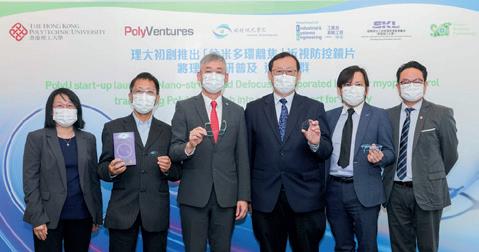
Students acquire the sense of intellectual ownership and a better understanding of their own abilities, and become caring, innovative and effective in their communication with the schoolchildren and community stakeholders.
Subject: Engaging in Workforce Health for Health Care Workers in Nursing Homes
Hosted by the School of Nursing, the subject requires students to identify the health needs of healthcare workers, and then plan, implement and evaluate a programme of workforce health and wellness promotion. Students reflect throughout the whole learning journey.
Subject: Learning through Providing Eye Care and Vision Health to the Community
The subject, hosted by the School of Optometry, aims to help students understand the basic concepts of vision screening and become familiar with simple clinical tests for vision assessment. Students work in groups to develop a vision screening project to serve underprivileged communities in Hong Kong who have difficulty in accessing vision and eye healthcare services. In the 2021/22 academic year, 237 students enrolled on the subject.
Online Health Talks for the PolyU Community Between November 2021 and April 2022, the University Health Service has hosted four health talks: three focusing on Traditional Chinese Medicine (TCM) and one on nutrition, engaging 320 participants in total. The first TCM talk aimed at increasing understanding of how TCM can help alleviate stress and prevent emotional disorders; the second discussed how TCM might be useful in the prevention and treatment of COVID-19; the last TCM talk—“Seasonal Heart Care”—intended to increase self-awareness of cardiovascular health and the importance of an appropriate diet, exercise and emotional regulation. Finally, the nutrition talk reflected on how hectic urban living, and unhealthy lifestyles and dietary habits can lead to cardiovascular diseases.

06

Engagement
GOOD HEALTH AND WELL-BEING
New Call Centre on Campus Supports Hospital Authority’s Hotline
Dedicated nursing students and teachers from the School of Nursing have set up a new call centre on the PolyU campus to support the Hospital Authority’s hotline service for COVID-19 patients. The Centre initially provides ten hotlines for 14 hours each day, handling nearly 600 calls daily.

One Stop Shop—Embrace Your Life with Love, Care and Hope
Launched by the Department of Applied Social Sciences in 2022, PolyU’s online anti-epidemic platform “One Stop Shop” provides a range of co-created COVID-19 information and resources. The Department has mobilised students, staff and alumni, in collaboration with social services organisations and professional bodies, to provide resources that include a series of professional talks, physical and mental health workshops and advice from recovered COVID-19 patients. It is hoped that through this online initiative the Department can interact with the community and overcome the epidemic in the long term via co-creation, co-production and co-learning.

PolyU Jockey Club “Operation SoInno” Programme
Organised by the Jockey Club Design Institute for Social Innovation and funded by The Hong Kong Jockey Club Charities Trust, the Solnno social innovation project was launched in August 2018 to create solutions to social challenges in Hong Kong. The programme aims to generate innovative ideas and actionable prototypes focusing on the impact of the ageing of people and buildings. Its four main features are: (i) “One from Hundred Thousand” public symposia and workshops, (ii) SoInno Action Projects, (iii) SoInno Design Education and (iv) SoInno Knowledge Platform.
In 2021/22, 5,159 participants were engaged in the project; while 8,857 accessed the online resource platform.
Mental Health Caring Project
Recognising the importance of psychological fitness in overcoming life’s challenges, the Mental Health Caring Project operated by the Student Affairs Office has the overall aims of promoting the general awareness of the importance of mental health on campus and enhancing the overall psychological wellness of the PolyU community. To achieve these aims, the project equips participants with basic knowledge about mental health and ways to cope with mental health issues through activities such as art-making sessions, talks and workshops.
In the 2021/22 academic year, over 200 students benefitted from participating in the project.
07
Policies and Operations
Exercise is Medicine® On Campus (EIM-OC)
PolyU received the EIM-OC Gold Level Award presented by the American College of Sports Medicine in 2022, in recognition the University’s efforts in promoting a healthy campus.
EIM-OC’s mission is to promote physical activity on higher education campuses. Integrated with the “Healthy Life Style” courses for all undergraduates, the physical and virtual courses were attended by around 900 students, which provided them with tools necessary to strengthen lifelong healthy physical activity habits and prevent onset of physical diseases and mental health issues. To support this initiative, PolyU developed a mobile application “WellFit” attracting over 300 students to revisit the tools and exercises using slow-motion videos.
Wellness Promotion on PolyU Campus: Wellness-in-Action
Integrating sports and counselling, Wellness-in-Action is a year-round campaign with approximately 2,000 student beneficiaries annually which aims to foster a thriving culture of both physical and psychological wellness within the university community. Students are
provided with a wide range of activities to boost their physical and psychological well-being. These include, for example, a campus-wide campaign with physical fitness and experiential workshops focusing on self-care and arts and crafts. Through these activities, it is intended that students will be able to step out of their comfort zone, achieve physical and psychological well-being, and most importantly, develop positive values.
Mental Health Support to Staff and Students
In addition to establishing the Mental Wellness Clinic, the University supports various mental health initiatives. For staff, these include the Employee Assistance Programme which provides professional counselling and a 24-hour hotline and which, from 1 November 2021 to 31 October 2022, handled 132 service requests and organised wellness seminars/workshops for 326 participants With the 2021/22 budget of approximately HK$1 million, the University also sponsored the Staff Club to run recreational activities for staff members catering for 1,231 participants. Over 6,600 counselling sessions were offered to around 1,300 students and more than 700 access to online counselling ChatBOT were recorded since its launch in March 2022.
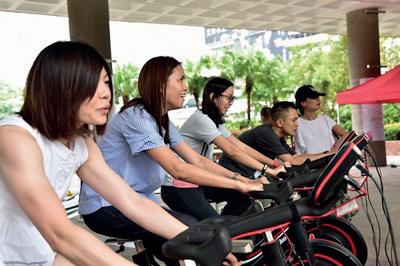
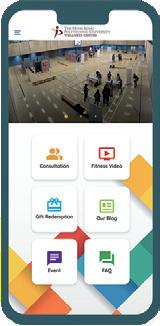
2,777 Scholarly Output
2.98
80,257 Citation Count
08
FWCI

Research
QUALITY EDUCATION
Students’ Real-Time Online Learning Readiness during the COVID-19 Pandemic
A research study led by the Department of Industrial and Systems Engineering evaluated the effect of real-time online learning on learning motivation and readiness, as well as the self-efficacy of sub-degree (SD), undergraduate (UG) and postgraduate (PG) students.
PG students were found to have higher mean scores in terms of learning motivation and technological readiness compared to SD and UG students, and thus the impact of online learning was relatively
Education
Service-Learning: Aligning with Sustainable Development Goals
As a compulsory component of the undergraduate curriculum, the PolyU Service-Learning (SL) Programme provides students with opportunities to apply their professional knowledge to serve those in need and learn from the experience. PolyU provides a diverse range of SL subjects which closely align with the UN SDGs, playing a prominent role in nurturing responsible leaders and global citizens. By integrating sustainability competencies and concepts into the design and implementation of SL projects, students are able to develop a deeper understanding of the global challenges and are empowered to contribute actively to creating positive change.
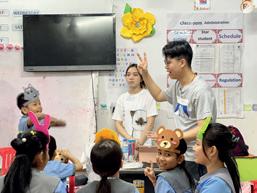
No. of Undergraduate Student Enrolment:
4,417
No. of Service Hours:
176,680
No. of Subject Offerings:
74
lower on these students. Looking to teaching models in the post-COVID era, the researchers emphasised the importance for educators to address the distinctive learning needs of SD, UG and PG students.
Trilingual and Biliterate Language Education Policy in Hong Kong
Hong Kong has long upheld a ‘trilingual and biliterate’ language policy, covering English, Cantonese and Putonghua. However, recent public exam results show a drop in language ability of students in both Chinese and English.
Recognising the importance of an adequate linguistic ability not only in education but also in the broader societal context, Professor David Li Chor Shing, Adjunct Professor and former Head of the Department of Chinese and Bilingual Studies has advocated new policies to address this issue:
• Mainly using Cantonese as the medium of instruction at the pre-school level;
• Promoting total immersion in a Putonghua language setting at the lower primary level; and
• Encouraging civil servants, schoolteachers and university staff to embrace a ‘speak English/Putonghua where we can’ campaign.
“INSPIRE” Mentorship Programme
Since its launch in 2020, PolyU’s university-wide mentorship programme, “INSPIRE”, has gained considerable support from 175 local and non-local prominent leaders and role models, including University Council and Court members, University Fellows, outstanding alumni and Poly-preneurs, who have served as mentors to offer insightful guidance to 723 student mentees from diverse cultural backgrounds and representing all faculties and schools. Through a variety of mentoring events, including face-to-face and online meetings, company visits, workshops, themed talks and sharing sessions, the students’ holistic education experience, intellectual growth and professional development have been significantly enhanced.
READ@PolyU Campus Reading Programme
Initiated and hosted by the PolyU Library, the campus-wide READ@PolyU Programme aims to build an empathetic, creative and courageous community of learners and global citizens for whom reading is a source of knowledge and creativity. The programme was launched in 2011 to promote a love of reading and, to date, remains the only one of its kind in Hong Kong. Each year, first-year students are invited to collect a free copy of the common book, join a Book Chat Group and other exciting literary events such as author talks, book exhibitions and writing contests.
MakerMindset
@i-Space Programme for Digital Literacy
The PolyU Library’s MakerMindset@i-Space Programme provides an array of seminars, webinars, workshops and competitions for students from diverse academic and societal backgrounds to have the opportunity to explore and experiment with emerging technologies such as the internet of things, 3D modelling, virtual reality programming and AI. Through collaboration with i-Space industrial partners, the Library provides students with free-of-charge task-specific workshops to enhance their digital literacy.
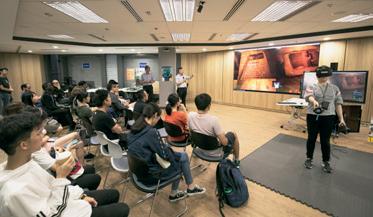

09
Engagement
SoInno Design Education
Hosted by the PolyU Jockey Club Design Institute for Social Innovation, SoInno Design Education incorporates the UN SDGs into its curriculum and at least one into each student project. SoInno is dedicated to introducing social innovation and design thinking into secondary education. It aims to foster creativity, design thinking, problem-solving and 21st-century skills in young people, preparing them to more actively contribute to society. The project collaborates with educators to co-develop student-centred learning and teaching solutions, nurturing students’ ability to integrate knowledge from different subjects through solving real-world problems. To date, more than 35 schools and over 1,200 teachers and students have benefitted from participation.
Partnering with Foundations to Promote Service-Learning in Secondary Schools
Partnering with Chow Tai Fook Charity Foundation and Keswick Foundation, PolyU has launched a three-year research project “Capacity Building Scheme for Secondary School Teachers: Promoting Meaningful Social Engagement for Young People through Service-Learning”. The project was made possible due to the generous donation from the two local Foundations and it has been enrolled by 53 local secondary schools
NAIL "IT": Navigating in ICT Lifelong Learning

The project “NAIL ‘IT’: Navigating in ICT Lifelong Learning”, initiated by the Department of Applied Social Sciences, empowers older adults by offering specialised Information and Communications
Policies and Operations
Open Access Library Resources for Learning and Teaching
The PolyU Library houses extensive collections covering a wide range of disciplines with holdings reaching 8.1 million in 2021/22. 99.8% of journals and 86.4% books are accessible online. It has archived open educational resources created by the PolyU community and facilitated the use of public domain, e-learning resources via the PolyU Institutional
Research Archive, PolyU Electronic Theses Database, Open Educational Resources Portal, Digital Collections Portal and Outstanding Work by Students Portal.
Meanwhile, “InfoLit for U”, a MOOC project led by the PolyU Library, aims to help students become analytical, wise and creative information users for effective university learning and tackling professional challenges after graduation.
Technology courses designed for the third age, taught by trained tutors who are also older adults. The project objectives include promoting cyber security awareness, enhancing older adults’ technological capacity, connecting them digitally with the community, and expanding their social circles. By providing practical skills and knowledge, the project enables older adults to navigate the digital world and use applications for daily life and health management, while also fostering social interaction and networking opportunities.
In-House Staff Training Programme
Offered by the Human Resources Office, the PolyU staff training programme aims to promote lifelong learning and strengthen knowledge and skills in the workplace. A wide range of courses are offered with topics that include legal knowledge, performance management, Chinese and English language proficiency and other soft-skill enhancement.
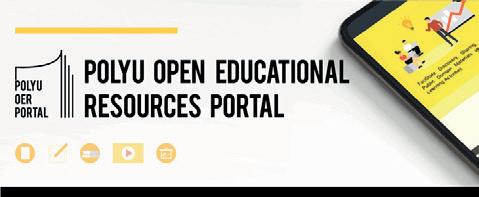
1.62 FWCI 4,749 Citation Count 552 Scholarly Output

Research
GENDER EQUALITY
Gender Inequality during COVID-19 Pandemic
The research conducted by Professor Daniel T. L. Shek, Chair Professor of Applied Social Sciences at the Department of Applied Social Sciences, examined the impact of COVID-19 on different aspects of quality of life, such as the issue of gender inequality. Women are typically perceived as a caretaker in the family, the pandemic has further aggravated the unequal distribution of workload for them, alongside the additional supervision of children taking online lessons at home. The data from the US, Germany and Singapore also revealed more work changes (e.g. unemployment) for women compared to men and affirmed an increase in unpaid care work for women relative to men.
Impact of Top Management Teams on Women-Led Businesses
In the context of the unintended consequences of seemingly beneficial gender equality practices, a research team led by Dr Amy Y. Ou, Associate Professor of the Department of Management and Marketing, investigated whether and when female representation in top management teams (TMTs) affects an organisation’s decisions to support women-led businesses. They hypothesised that when women executives were a tokenistic minority, TMTs with more female representation were less likely to support women-led businesses. However, this negative effect could be reduced when the TMT had more politically neutral members or when they shared prior employment affiliations.
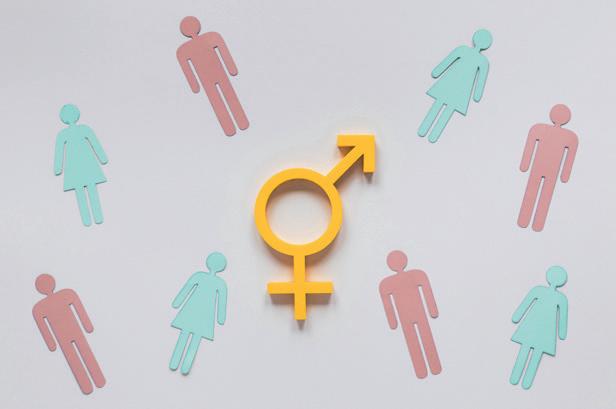

Education
Subject: Gender and Social Changes in Chinese Societies
Hosted by the Department of Applied Social Sciences, the subject provides students with basic knowledge and concepts in gender studies. It also trains students’ ability to relate gender to broader sociopolitical changes in Chinese societies, while increasing their gender awareness and sensitivity. They learn to discern different levels of gender equality/inequality, analyse how gender affects relationships, and strengthen their ability to communicate with people of all genders.
Subject: Gender and Social Work
The subject is offered by the Department of Applied Social Sciences and allows students to learn to identify the nature of social construction of gender identity and gender issues in the context of Hong Kong. By reviewing existing social work theories/models, social work students are able to develop a gender-conscious perspective when working with service users, understand the effectiveness of gender conscious practice in evoking service users’ voices, and be exposed to and practise appropriate skills to work on gender-related issues in local service contexts.

11

Engagement
Conference on Adolescent Sexual and Reproductive Health
Jointly organised by The Family Planning Association of Hong Kong and PolyU’s School of Nursing in 2021, the 7th Biennial Cross-Strait, Hong Kong and Macau Conference on Adolescent Sexual and Reproductive Health aimed to promote exchange of research findings, ideas and experiences related to adolescent sexual and reproductive health among healthcare professionals, educators, researchers and policy makers. Specifically, Professor Edward K. L. Chan, Chair Professor of Child and Family Welfare at the Department of Applied Social Sciences delivered a presentation and illuminated the health impact of dating and gender violence.
Women’s Health Physiotherapy Service Offered by Rehabilitation Service Centre
With a focus on women’s health physiotherapy, the Department of Rehabilitation Sciences operates the Centre, where women’s health physiotherapists can provide assessment and treatment in the management of conditions unique to women. The assessment may involve an internal vaginal examination which can allow the physiotherapist to properly examine any weakness, spasm or change to the pelvic floor muscles, thus planning and providing individually focused training exercises, self-management strategies and education. Other specialist women’s services include post breast cancer surgery rehabilitation and physiotherapy management for lumbo-pelvic pain related to childbirth.

Policies and Operations
Breastfeeding-Friendly Workplace
PolyU has implemented breastfeeding-friendly measures to support female staff who breastfeed. This includes lactation rooms and breaks during working hours. These measures aim to create a supportive environment, promoting work-life balance and employee well-being, particularly for female staff members.

Around 50% full-time staff are female
Gender Equality Policies
The avoidance of discrimination on the basis of gender or any other factors is a well-embedded principle in all the University’s human resources processes. PolyU has clear human resources policies that include the University Recruitment Policy, Equal Opportunities Policy, and General Code of Ethics to ensure fairness and transparency in the workplace.
2,591 Citation Count 150 Scholarly Output
2.25 FWCI
12
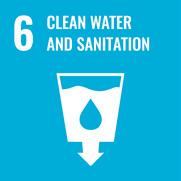
Research
CLEAN WATER AND SANITATION
New Filter to Ensure Clean Water
Dr Jiang Yi, Associate Professor of the Department of Civil and Environmental Engineering, and his team have developed a new water filter which has significantly advanced water purification technology. Their filters were first devised from a new two-dimensional nano material, graphene oxide (GO), which can be assembled into a membrane. Despite their outstanding separation performance, the membrane’s instability limited its separation performance and long-term applications. To address this, the team developed a new ‘magnetically ultra-stabilised GO-based membrane filter’. The filter not only exhibits effective separation performance, but also inactivates waterborne pathogens, making it suitable for many water purification applications.

Waste-Derived Biochar for Water Pollution Control and Sustainable Development
Biochar, derived from the combustion of biomass wastes, serves as a negative carbon emissions technology and is used to reduce pollutants. A team from the Department of Civil and Environmental Engineering has been examining its applications in treating municipal wastewater. They have found it efficient in targeting primary contaminants in industrial wastewater. When added to drainage systems, it can reduce the impact of stormwater and improve the erosion resistance and water retention capability of the structure. Biochar is thus a revolutionary means of water treatment, contributing to clean water and sanitation for a more sustainable ecosystem.
Natural Porous Materials for Interfacial Solar Steam Generation towards Clean Water Production
Researchers of the Department of Applied Physics and Materials Research Centre have been investigating the green solar-driven water vaporisation technology which was considered a sustainable solution to water shortages. They have reviewed the use of natural porous materials for vapour generation which could help ensure low-cost fresh water. It was found that the critical selection of evaporation material for successful vapour generation depended on various factors including optical absorption capacity, evaporation efficiency, stability and cost. The team argues for the development of a more efficient natural porous-based photothermal evaporator with high stability, recyclability and environmental compatibility that can be used on a large scale for practical applications.
Education
Water and Waste Treatment
Students from the Department of Applied Biology and Chemical Technology and the Department of Civil and Environmental Engineering can take subjects focusing on water management and waste treatment which introduce the requirements of water quality in relation to different sectors, different management and treatment methods of wastewater, and the kinetics involved.
Aiming to help students develop an understanding of the general principles of water and waste treatment, control and management in Hong Kong, the courses’ field visits, laboratory work and wastewater treatment plant design project provide students with first-hand information about and experience of the treatment of waste.
Subject: Surface Water Quality Modeling and Reactor System
With a focus on water quality control in relation to common water reactors, the subject, hosted by the Department of Civil and Environmental Engineering, aims to provide students with a clear understanding of the mechanisms leading to various types of water
quality behaviour, a rational basis for devising water quality control strategies, knowledge about the fundamental reaction kinetics, methods of analysing data collected from laboratory results, and the ability to critically analyse data and incorporate results into design solutions to real problems.
Engagement
Webinar on Advancing Wastewater Treatment

Organised by the Department of Civil and Environmental Engineering and in cooperation with the Research Centre for Resources Engineering towards Carbon Neutrality and the Hong Kong Institution of Engineers Civil Division, Dr Ling Leng, former Research Assistant Professor delivered an online seminar “Biotechnology Advances for Xenobiotics Degradation and Resource Recovery in Wastewater Treatment” on 27 July 2022. The seminar highlighted the progress having been made in wastewater treatment technology by integrating genomic analysis, machine learning and bioreactor engineering, with the goal to address challenges at the nexus of waste, energy, health, and carbon neutrality.
13
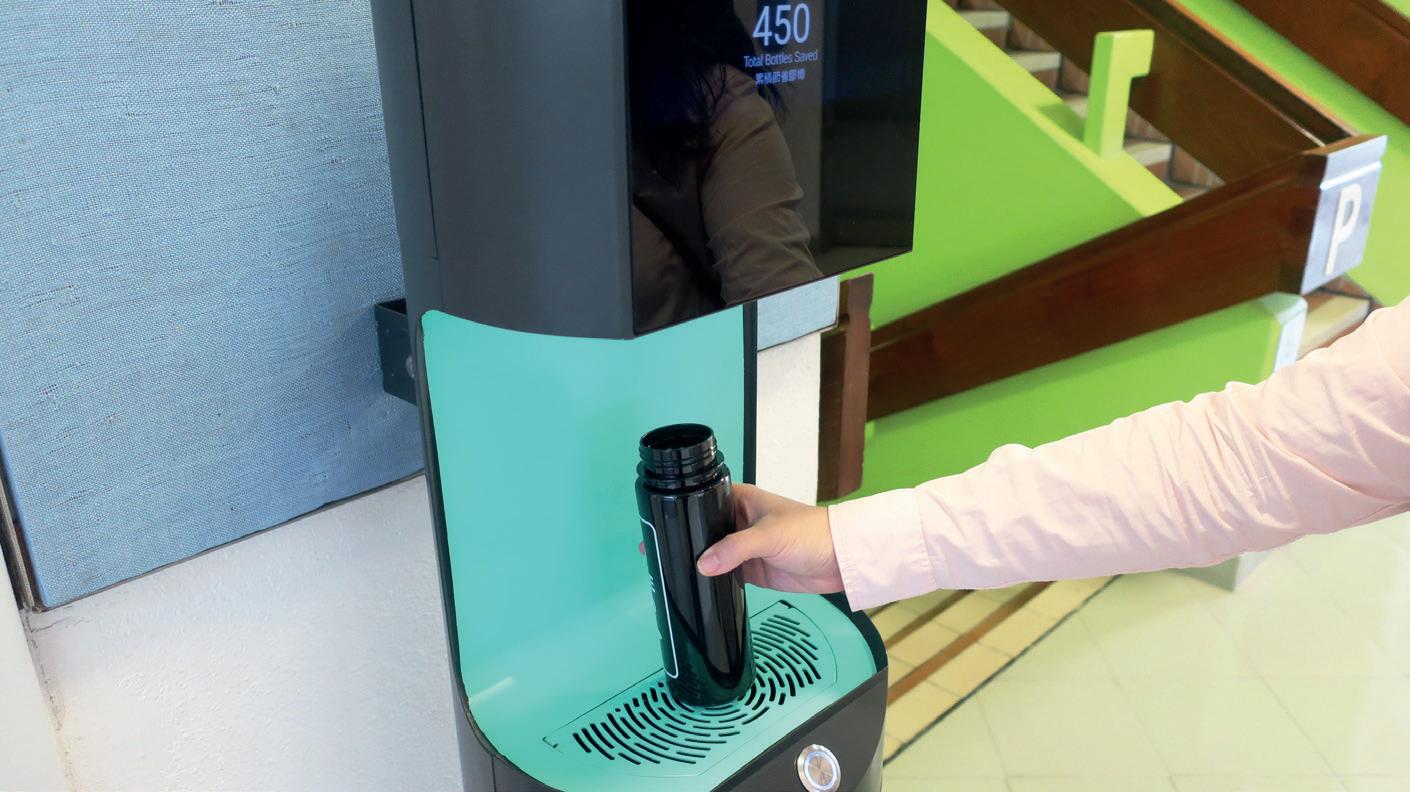
Policies and Operations
Water Conservation Policy
The University introduced a Water Conservation Policy in 2014 with the aim of saving water and implementing appropriate measures to ensure environmentally friendly campus development, operation and activity through incorporating water-saving features into all building designs and refurbishments, reusing grey water, minimising wastage through proper maintenance, and achieving quantifiable management goals. The Policy is also intended to enhance awareness within the University community of the need for water conservation.
Drinking Water Facilities
PolyU has installed drinking water fountains and water dispensers at over 20 convenient locations on campus to ensure drinking water is readily available and to encourage the refill of Bring Your Own (BYO) bottles and thus reducing plastic waste on campus. The web-based platform GreenMap@PolyU provides an easy way to locate these water stations. PolyU aims to keep the PolyU community hydrated while contributing to a more sustainable campus environment.
22,313
14
FWCI
2.95
Citation Count 609 Scholarly Output

Research
AFFORDABLE AND CLEAN ENERGY
Otto Poon Charitable Foundation Research Institute for Smart Energy
The Institute is dedicated to developing innovative and sustainable energy technologies and solutions. With about 50 faculty members from 12 departments, its research focus areas include district energy systems and smart grid, smart buildings and smart energy systems, advanced energy storage technologies, advanced and renewable energy conversion technologies, and advanced energy materials.
Optimal Control Strategy for Use of Building Heating, Ventilation and Air-Conditioning (HVAC) Systems
The instantaneous balance and reliability of power grids is conventionally guaranteed through frequency regulation provided at the supply side. Due to the
increasing involvement of intermittent renewable power generations, more frequency regulation capacity will be needed. A research conducted by Ir Professor Wang Shengwei, Director of Otto Poon Charitable Foundation Research Institute for Smart Energy, Chair Professor of Building Energy and Automation, and Otto Poon Charitable Foundation Professor in Smart Buildings at the Department of Building Environment and Energy Engineering, has proposed a hierarchical optimal control strategy consisting of a regulation bidding controller and a power use following controller. It is validated on a simulation test platform and its value proved in maximising the use of regulation capacity provided by HVAC systems while ensuring the indoor environment control quality under a given guarantee rate. It does not involve complex optimisation technologies, which is very convenient and valuable in actual use.
Efficient and Scalable Moisture-Electric Generators from Ionic Hydrogel
Moisture-electric generators (MEGs) use chemical energy from atmospheric moisture to generate electricity without causing pollutions and harmful gas emissions, but most suffer from intermittent electrical signals and low currents. A team led by Professor Tao Xiaoming, Director of the Research Institute for Intelligent Wearable Systems, Chair Professor of Textile Technology at the School of Fashion and Textiles, has developed an efficient ionic hydrogel moisture-electric generator (IHMEG) with flexible, lightweight and all-weather adaptable features.
The IHMEG operates in a stable manner in a wide range of environmental conditions from 10% to 85% relative humidity (RH) and is thus a promising green power source for Hong Kong, where RH fluctuates between 40% and 90% throughout the year.
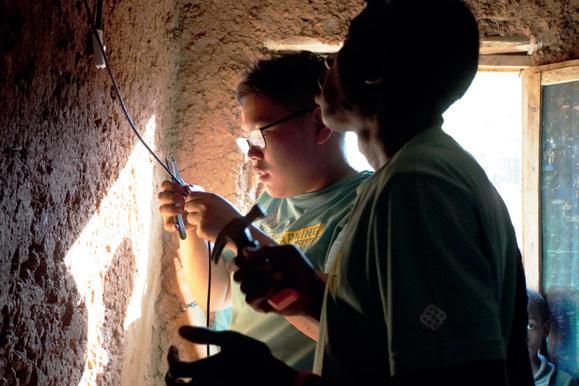
Education
Habitat Green in East Africa
Habitat Green is a PolyU service-learning and leadership programme focusing on nurturing students’ global leadership and cultural sensitivity in the context of interdisciplinary green engineering, appropriate technology and sustainable living. Students are trained to work with local students in Rwanda to design solar energy panels and develop green energy solutions for families in remote villages.
In the process, they learn about the concepts of socially responsible leadership, intercultural competences, racial tolerance and global citizenship, and demonstrate these in practice. They also learn about green engineering, sustainable development and appropriate technology, adopting the concepts into the service projects.
Subject: Renewable Energy for a Sustainable World
This subject aims to foster students a sense of wonder and curiosity about science and energy, providing them with an introduction to important renewable energy resources and technologies used for harnessing these, within a framework of a range of simple to state-of-the-art advanced energy systems. It helps students understand present energy needs and future demand by examining conventional and renewable energy technologies, which help them analyse problems relating to renewable energy production and use, and evaluate the feasibility of possible solutions.
15
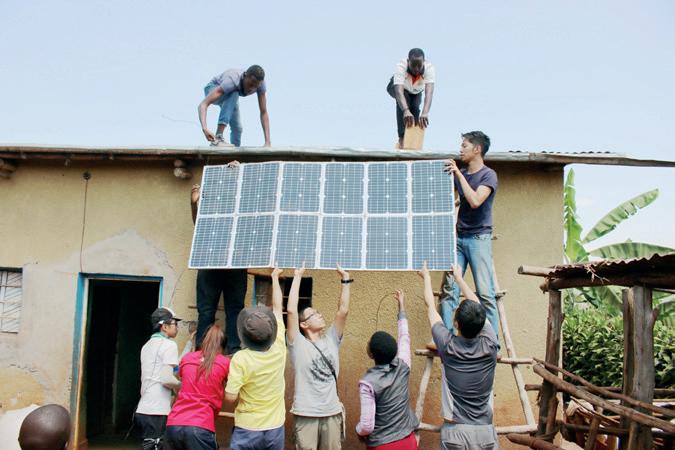
Policies and Operations
Energy and Greenhouse Gas Policy
The Policy was established in 2014, committing the University to responsible energy management and carbon emission reduction. It aims to meet this commitment through energy-efficient design and practices in all its development initiatives and in respect of its premises, plant and equipment, and other activities entailing environmental considerations. The University also pledges to comply with relevant energy legislation, standards, regulations and code of practices, while striving to attain energy efficiency and reduce carbon emission through proper maintenance and monitoring of campus operations and practices.
Engagement
Rural Electrification in Africa
Having started by assessing the needs of Rwanda’s local communities in 2013, PolyU students began installing household-based solar panels since 2015. The current focus is on large-scale green engineering solutions to help rural households. In addition to installing standalone solar energy systems which provide electricity for light, students have successfully set up stations to provide charging capacity for households. Furthermore, they have trained local youth and nurtured their ability to maintain the systems, aiming to make these effective and sustainable.
In 2021/22, they have served 200 rural households in Rwanda.
Public Sustainability Lecture and Seminar
Co-hosted by the Consulate General of France in Hong Kong and Macao, the PolyU Research Institute for Sustainable Urban Development and the Research Innovation Office, the Sustainability Lecture Series: The Decarbonisation Challenge — Energise The Future: Potential & Challenges — From Smart Buildings to Waste-to-Energy brought together speakers from the academic and business communities to share their views, experiences and good practices related to energy sustainability. 88 participants were engaged.
A research seminar related to advanced and renewable energy conversion technologies was also hosted by the Otto Poon Charitable Foundation Research Institute for Smart Energy.
PolyU Building-Integrated Photovoltaics Applications
In order to promote clean, eco-friendly and renewable energy, PolyU has installed building-integrated photovoltaics applications in various parts of the campus. By applying ‘nanocomposite paste for self-cleaning photovoltaic panels’ on photovoltaic panels, organic compounds and pollutants are decomposed and washed away by rainwater, increasing the photovoltaic system’s generation by about 5 to 10%. Furthermore, through academic collaboration, the University has also replaced and recommissioned the central air-conditioning plants to reduce energy consumption.
With regard to the enhancement work of the university main entrance, photovoltaic panels have also been installed along the top of its new canopy.
PolyU Air Conditioning (A/C) On-Demand Services
By applying a ‘non-auto restart function’ to thermostats in staff offices, developing an A/C on-demand control strategy and engaging departments to participate in the A/C on-demand service with an incentive scheme, electricity wastage on campus has been reduced and departments are encouraged to maintain energy savings.
Sustainability Awards in Smart Energy Use
PolyU has been granted the title of Hong Kong Green Organisation (HKGO) by the Environmental Campaign Committee and the Environmental Protection Department since 2016. This sustainability recognition affirms PolyU’s efforts and commitments to the environment. PolyU has also been repeatedly awarded with the Excellent Level for Energywi$e Certificate for its commitments in energy efficiency.
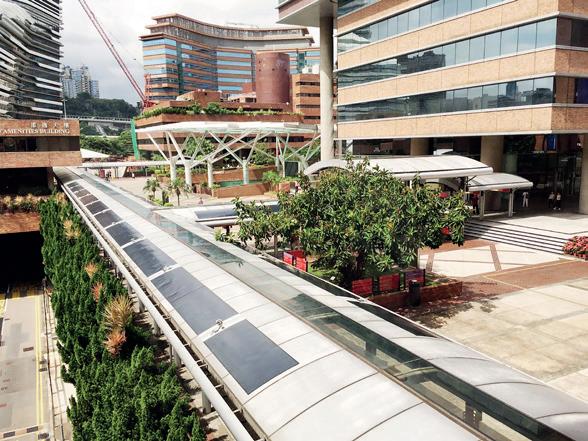
16 2.43 FWCI 99,053 Citation Count
Scholarly Output
3,202
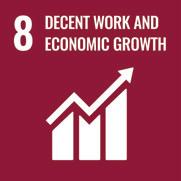
Research
DECENT WORK AND ECONOMIC GROWTH
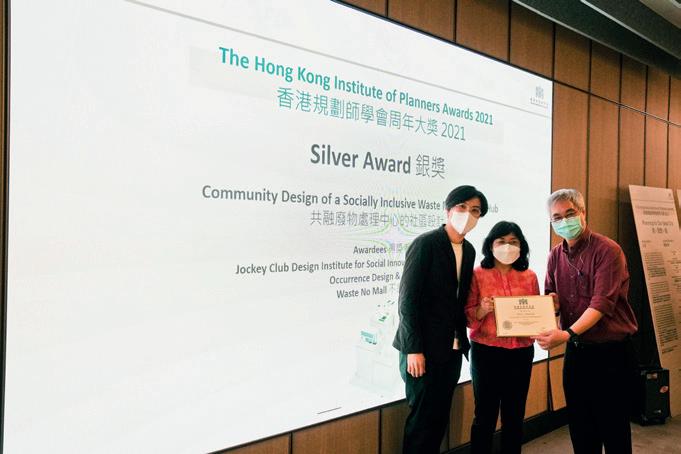
The Socially Inclusive Waste Management Hub
Taking the opportunity of a planned six-storey Government, Institution or Community (GIC) building with the refuse collection and recycling facilities, a Jockey Club Design Institute for Social Innovation project proposed an alternative waste management model that emphasises improving the working conditions of frontline cleaners and destigmatising the waste management industry by championing a community planning-based approach to waste management and supporting waste reduction. The project, which involves the design of a community waste management hub that promotes the concept of a friendly working environment and respects the dignity

of sanitation workers who are generally marginalised, won a Silver Award at the Hong Kong Institute of Planners Awards 2021.
Customised Trolleys for Waste Pickers
Dr Crystal Kwan, Assistant Professor of the Department of Applied Social Sciences, and Dr Arnold Wong, Associate Professor of the Department of Rehabilitation Sciences have released a research report on a project investigating the needs of frontline elderly waste pickers and assessing their physical and mental health by providing customised trolleys for their collection of recyclables. The trolleys not only indicated a clinically significant reduction in back and leg pain, but also the collection of an enhanced volume of recyclable items. Interestingly, it was also found that participation in the intervention enhanced the pickers’ social relationships at their worksite, where they gained peer support, new friendships and increased respect.
Assessment of System for Reducing Physical Stress in Construction Workers
PolyU scholars from the Department of Building and Real Estate have conducted a research studying the effects of a passive exoskeleton system on spinal biomechanics and subjective responses during manual repetitive tasks in the construction industry. It was found that the system significantly reduced perceived discomfort in the lower back for the heaviest lifting loads, indicating that the system could reduce the internal muscle force, extensor moments and spinal forces in the lumbar region. The majority of participants
Education
Work-Integrated Education (WIE)
rated the passive exoskeleton system as acceptable, further supporting its value in the industry.
Informal Employment of Workers in Food Delivery Platforms in Mainland China
Dr Jenny Chan, Associate Professor of the Department of Applied Social Sciences, has investigated how food delivery platform firms in Mainland China manage their couriers through service contracting rather than formal employment, and how the couriers experience control and autonomy at work. She found that a combination of data-driven surveillance systems and customer feedback mechanisms incentivise workers’ efforts. Individual freedom, she suggests, is framed as the lack of a requirement to work a minimum number of hours. This flexibility, however, means that when there is lower customer demand, the platform automatically reduces the company’s dependence on labour. Thus, minimum earnings are not guaranteed, leaving informal workers struggling for their livelihoods.
Centre for Economic Sustainability and Entrepreneurial Finance (CESEF)
The Centre, hosted by the School of Accounting and Finance, aims to encourage economic growth by promoting sustainability among local enterprises, developing partnerships with various industries through knowledge transfer and helping them embed environmental, social and governance (ESG) and green finance into practice. With a global and professional outlook, the CESEF team has achieved remarkable results and contributed to areas such as sustainable economy and entrepreneurship.
The mandatory WIE programme, the first of its kind in the tertiary institution in Hong Kong, provides undergraduate students with work-based learning experiences relevant to their future profession. Students who undertake non-local internships are able to reap the dual benefit of gaining practical work experience while broadening their cultural horizons. In the 2021/22 academic year, around 4,900 students completed the WIE programme either physically or virtually in a wide variety of industries, including around 300 opportunities in various cities in Mainland China and overseas countries.
17
Education

Engagement
Project Delivery Capability Programme
In December 2021, the Department of Building and Real Estate was appointed to design and deliver the Project Delivery Capability Programme for senior construction professionals of the Hong Kong Government. Students included architects, engineers, surveyors and other industry specialists — comprising the core of the public project delivery team and serving as a critical bridge between frontline workers and project leaders. The programme aims to boost participants’ managerial skills and ensure that Hong Kong infrastructure projects are completed to a high quality, on time and within budget, and that they add value to the economy and community.
Foundation Certificate in Opinion Survey Interview Training for Elderly
Funded by the Employees Retraining Board and hosted by the PolyU Institute of Active Ageing, the Foundation Certificate in Opinion Survey Interview Training for Elderly course commenced in July 2022. Students are unemployed individuals aged 50 or above who are seeking re-employment. The course focuses on different modes of interviewing; techniques for on-street, door-to-door and telephone interviewing; handling interview issues and conflict; and enhancing participants’ personal and job-hunting skills, and preparation for employment.
Career Development and Training for Students and Recent Graduates
The Student Affairs Office empowers students and recent graduates to make informed decisions about their careers and provides them with the support and resources they need to achieve their goals. Apart from sourcing internship opportunities from employers around the world, the Office hosts the “INSPIRE” Mentorship Programme, various career training and development workshops, and provides one-to-one career consultation sessions to facilitate students’ acquisition of necessary work competencies. Over 4,300 engagement were recorded in 2021/22.
Subject: Corporate Governance
The School of Accounting and Finance hosts this subject for the Master of Professional Accounting which aims at helping students identify and analyse business ethics issues pertaining to corporate governance, apply the concepts and principles of corporate governance to current corporate governance practices, and critically evaluate the corporate governance systems of Hong Kong and PRC-listed companies. Among the topics covered are business ethics, corporate responsibility, corporate codes of conduct, professional ethics, ethics and international business, the interests of stakeholders and corporate social responsibility. Students should be able to evaluate the effectiveness of the corporate governance system in Hong Kong and Mainland China.
Policies and Operations
PolyU Staff Association (PUSA)
All university full-time staff, with the exception of the President and his deputies, may join PUSA on a voluntary basis. PUSA is a registered trade union, aiming at raising the quality of professional life in the University. University Management has regular meetings with PUSA and engages them proactively on important policy changes. Currently, two staff representatives in the University’s Council are PUSA Chairman and Vice-Chairman. PUSA also organises from time to time activities such as outings, promotional sales, and other initiatives that promote environmental or sociopolitical awareness to its members.
Employment Practice Appeal Process
Harmony and cooperation amongst staff members are one of the essential elements of the University’s success and its pursuit of becoming a world-class university with an emphasis on the application value of its education and research. To support this, PolyU recognises the importance of establishing effective channels for addressing disputes, grievances and appeals. As a result, PolyU has developed a clear set of guidelines on grievances and human resources related appeals.
2.86
178%
23,153
18
FWCI
741 Scholarly Output Staff
of more than 24 months >80% Salary rate of FT staff: at least of the minimum wage (HK$37.5)
Citation Count
on contracts
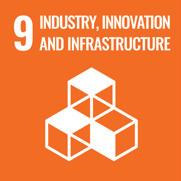
Research
INDUSTRY, INNOVATION AND INFRASTRUCTURE
PolyU Academy for Interdisciplinary Research (PAIR)
While emerging technologies are profoundly changing the way people live and work, the world faces multiple unprecedented challenges. To effectively respond to these, it is necessary to integrate expertise from different technical and scientific disciplines.
To this end, PolyU has inaugurated PAIR to promote impactful interdisciplinary research and innovation. PAIR comprises 11 research institutes and 6 research centres, making it one of the largest interdisciplinary research platforms in the Greater Bay Area. Academy goals include building a globally modern industrial system, promoting ecological conservation, expanding infrastructural connectivity, building a global technology and innovation hub, and contributing to the UN SDGs.
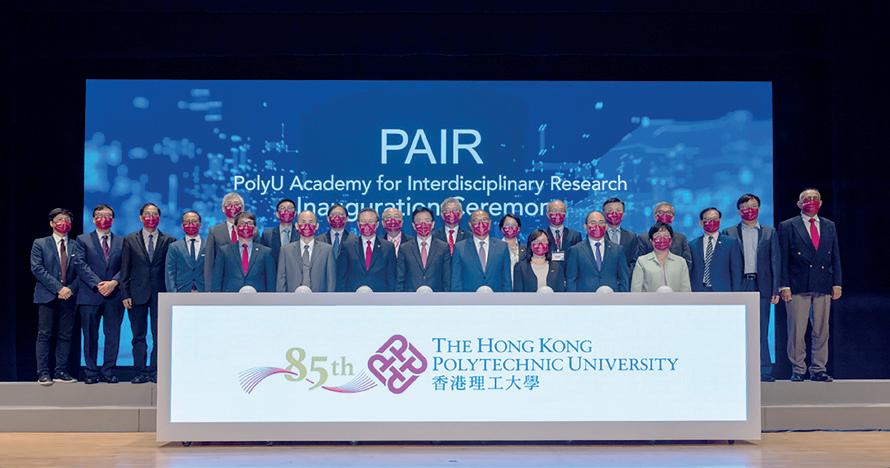
Conceptual Design and Performance Evaluation of High-Strength Pervious Concrete
Research led by Ir Professor Poon Chi-sun, Michael Anson Professor in Civil Engineering, Director of Research Centre for Resources Engineering towards Carbon Neutrality, Chair Professor of Sustainable Construction Materials, Head of the Department of Civil and Environmental Engineering, proposes a novel design concept of a high-strength pervious concrete, aiming at improving its compressive strength while ensuring adequate permeability. Experimental results show that the mechanical properties of concrete could be improved as a result of using ultra-high performance paste, improving homogeneity and compatibility between aggregates by eliminating coarse aggregates, and enhancing cement paste thickness between aggregates. These enable the production of a high-strength pervious concrete with a compressive strength of 60.93MPa and a water permeability of 0.37mm/s, which would potentially broaden the scope of application of pervious concrete.
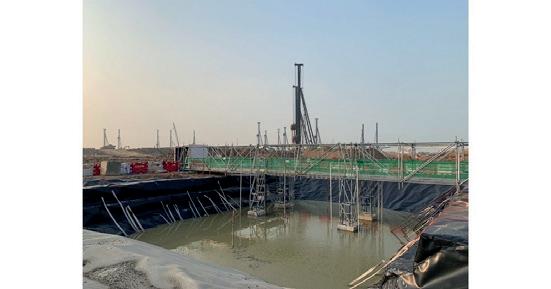
Pilot Trial of a New Land Reclamation Technique
A research team led by Ir Professor Yin Jianhua, Chair Professor of Soil Mechanics at the Department of Civil and Environmental Engineering, has developed an innovative technique for land reclamation using horizontal band drains to aid vacuum preloading to facilitate reuse of dredged sediment as fill material.
A pilot trial at a land reclamation site carried out jointly with the Civil Engineering and Development Department of the Hong Kong Government and industry partners has recently been completed successfully. Supported
by a Research Grants Council funding of nearly HK$10 million, the trial outcome will provide vital reference for sustainable marine reclamation in Hong Kong and will significantly advance understanding of soft ground problems.
Carbon-Neutral Biochar Partition Block
A team led by Professor Dan Tsang, former Professor of the Department of Civil and Environmental Engineering has produced application-oriented biochar from yard waste and developed the first carbon-neutral biochar partition block with value-added and climate-smart functions. The block has diverse applications, ranging from improving soil fertility to being added to building materials to reduce the construction industry carbon footprint.
The project has received grants of approximately HK$8.8 million from the Hong Kong Government's Green Tech Fund and the technology has been commercialised through PolyU start-up NeutralCrete Limited. It is anticipated that widespread adoption of the new products would help reduce the burden on landfill sites and contribute to achievement of the Greater Bay Area’s aim of carbon neutrality.
19
Education
Undergraduate Research and Innovation Scheme (URIS)
Aiming to enhance technological innovation capabilities, PolyU launched the URIS in 2021. The scheme advocates inquiry-based learning to nurture the next generation of researchers and innovators, provides students with the opportunity to conduct research under the supervision of the University’s scholars. It offers an important chance for students to develop higher-order thinking skills, such as logical, innovative and critical thinking. The experience and skills acquired by students through their research also help broaden their future career horizons. More than 110 projects have been approved and funded, and over 200 students participated in the URIS in the 2021/22 academic year.
Cultivating Students’ Innovative and Entrepreneurship Mindset
The Department of Industrial and Systems Engineering (ISE) and the Department of Management and Marketing (MM) host a number of subjects which nurture students’ innovative thinking and entrepreneurship.
The ISE subject “Entrepreneurship and Innovation” aims to give students an overview of the concept of entrepreneurship and entrepreneurial strategies, while developing an awareness of the sources and processes of innovation, and the ability to analyse innovative business. Some MM subjects enable students to understand how to deliver social innovation to solve the world’s pressing issues, to achieve SDGs, and to develop an entrepreneurial mindset via project learning and guest lectures delivered by local entrepreneurs.

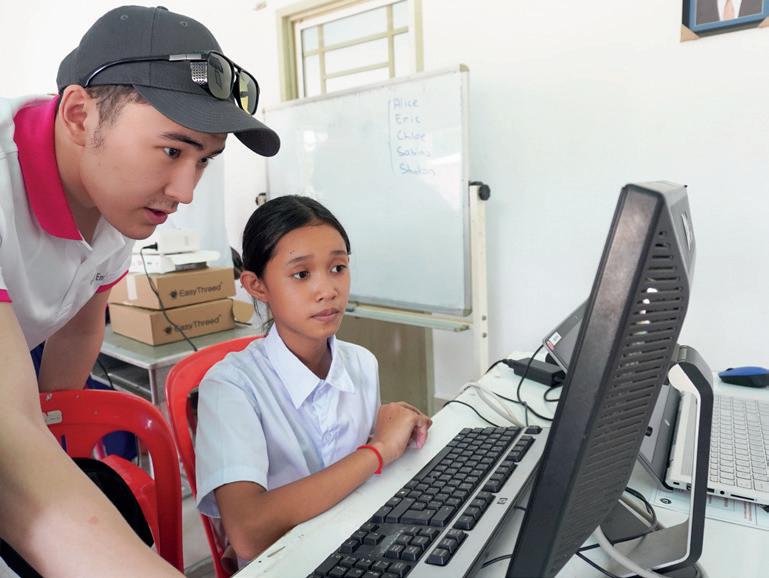
Incorporating STEM into Service-Learning Projects
PolyU believes that STEM education is a vital prerequisite for individual development and has integrated STEM into its service-learning programmes and projects.
For instance, “Promoting Digital Literacy in Developing Societies”, hosted by the Department of Electrical and Electronic Engineering, enables students to effectively apply their knowledge to practice as they conduct IT workshops, mini-lectures and hands-on training for service recipients in remote regions of Cambodia or Vietnam.
Another subject “Technology Beyond Borders: Service Learning across Cultural, Ethnic and Community Lines”, hosted by the Department of Computing, enables PolyU students to interact with children overseas who have little access to STEM education. Students introduce the children to trending technology concepts like artificial intelligence and machine learning, giving them an introduction to science and technology as well as helping to instil a passion for innovation. In the 2021/22 academic year, 163 students enrolled on the subject.
20

Engagement
PolyU InnoTech Open Day
INDUSTRY, INNOVATION AND INFRASTRUCTURE
The first-ever PolyU InnoTech Open Day was held on campus on 16 July 2022 to showcase the University’s efforts in promoting Innovation and Technology (I&T). The event was attended by members of the PolyU community, government officials, entrepreneurs, industry partners, start-ups, researchers and young talents, as well as prospective university students and their parents.
Supported by 19 key organisations in Hong Kong’s I&T ecosystem, the Open Day featured a wide range of activities such as breakout sessions for research and innovation, thematic tours, exhibition of impactful innovation, start-up pitching, unicorn’s sharing, as well as a virtual seminar given by the 2020 Nobel Laureate in Physiology or Medicine, Sir Michael Houghton.
Good Seed Programme
Good Seed is a social innovation training and funding programme developed by the Knowledge Transfer and Entrepreneurship Office and the Jockey Club Design Institute for Social Innovation, aiming at unlocking the creative potential of young people to drive social innovation for the benefit of the underprivileged, with design, technology and business as major foci.
From September 2021 to July 2022, the programme engaged 700 Hong Kong citizens in interactive training workshops which equipped them with understanding and skills needed to become social change-makers. A total of 166 preliminary ideas were co-created and 22 social projects were granted HK$200,000 to drive innovative solutions to tackle poverty issues and promote social inclusion among different target sectors.

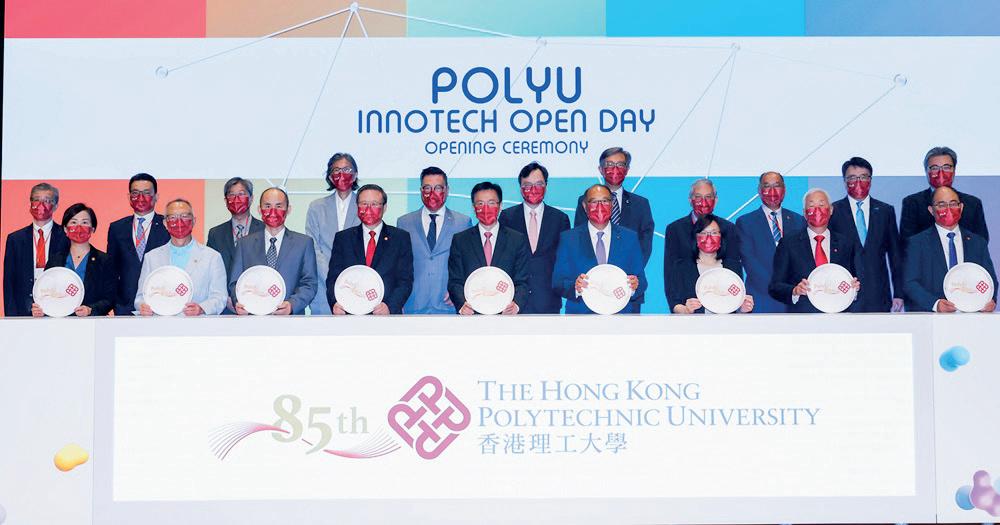
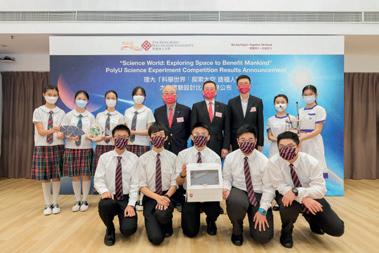
Science World: Exploring Space to Benefit Mankind
The science education programme was organised by the Research Centre for Deep Space Explorations and the Global Engagement Office, and included a space experiment competition which attracted 26 experiment proposals from 22 secondary schools It stimulated secondary school students’ interest in STEM education, deepened their understanding about benefits of space explorations to humankind, inspired their innovative thinking in technology through the utilisation of the China Space Station.
21
Policies and Operations
PolyU Proof-of-Concept (POC)
Funding Scheme 2.0
With the aim of instilling a problem-driven innovation mindset in young people, the POC Scheme was upgraded to POC 2.0 to support the ideation and prototyping of student innovations. In 2021/22, the scheme engaged 139 students and granted funding support to 38 projects, while supporting and preparing students to participate in local and overseas innovation and entrepreneurship competitions. PolyU teams won 29 awards in 2021/22, the highest number ever recorded.
PolyU Micro Fund Scheme 2.0
Launched in 2011, the Micro Fund Scheme was the first funding initiative to aim at cultivating an innovative and entrepreneurial spirit in the PolyU community, and promoting knowledge transfer and the commercialisation of PolyU’s innovations and technologies. Each selected start-up is awarded up to HK$120,000 and receives pre-incubation support. In 2021, PolyU partnered with Hong Kong Science and Technology Parks Corporation (HKSTP), upgrading the fund to the 2.0 Scheme. The upgraded scheme helps accelerate the rate at which PolyU start-ups enter HKSTP’s ideation and incubation programmes.
PolyU’s Entrepreneurship Society, InnoHub and PolyVentures Mentorship Programme
In 2021/22, the student-initiated PolyU Entrepreneurship Society recruited 124 new members to expand the entrepreneurship community, increasing the total membership to 772. In the same year, the University hosted 16 entrepreneurship events through PolyU InnoHub, attracting more than 1,200 participants. Furthermore, the PolyVentures Mentorship Programme was enhanced based on domains designed to provide systematic support to PolyU start-ups. A total of 31 industry and professional mentors have been engaged to advise and guide PolyU start-ups at different stages of development.

1,692
2.58
41,410
22
FWCI
Citation Count
Scholarly Output
Tech start-ups 220+ Design and social start-ups 230+ Total start-ups 450+ Academic-led start-ups 29 University spin-offs Included in Forbes Asia 100 to Watch List 30 Unicorns 4
entrepreneurs nurtured 1,477 Accumulative number of awards 329
trademarks granted 100
3 Accumulative
Patents and
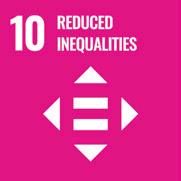
Research
REDUCED INEQUALITIES
Older Adults’ Use of Urban Parks in Hong Kong’s Low-Income Areas
Spatial justice, specifically accessibility, universal design, and protection of the dignity of vulnerable groups, is increasingly deemed relevant to the study of public spaces such as urban parks which often exclude the elderly. Researchers of the School of Design examined everyday activities of older adults in urban parks, focusing on a low-income, high-density and public space–scarce neighbourhood in Hong Kong. Highlighting the critical role of landscape infrastructure for healthy ageing societies, the study concluded that
Education

Inclusion Awareness Activities
In the 2021/22 academic year, more than 1,200 attendances were recorded for activities and training on inclusion awareness, with the aims to raise students’ awareness and prevent harassment on campus, encourage them to embrace diversity and provide peer support to students with special educational needs (SEN). The “Limitless” Festival, the University’s signature event for enhancing inclusion awareness on campus, has been held annually since 2016. Students and staff can also visit the Diversity Resource Centre which showcases assistive devices and resources to enhance understanding and acceptance towards students with SEN and people with disabilities.
hostile design prevents full use of seating facilities and affects group size. They also found, however, that sittable edges may directly contribute to park use by older adults with canes and walkers, particularly for those who are waiting at street crossings.
Diversity and Inclusion: Impacts on Psychological Well-Being among LGBTQ Communities
A team of researchers of the Department of Applied Social Sciences and the School of Nursing has analysed the literature that examines why society fails to provide
Showcasing the Power of an Inclusive Community
Hosted by the School of Fashion and Textiles, the service-learning subject “Community Engagement through Expressive Textile Arts and Fashion” aims to reduce inequalities and raise awareness of the need to build a harmonious and inclusive society. Through an interactive co-design process, students work with service participants to create expressive fashion prototypes, adopting fashion creativity and expressive textile arts as a caring medium. The completed prototypes are showcased at a presentation catwalk that increases public awareness and an understanding of individuals with special needs, helping them better integrate into society and receive more opportunities and support.

enough support to LGBTQ students and how such adolescents interact with others in the learning environment. It has also explored issues of violence and prejudice, which are fundamental causes of psychological problems among LGBTQ adolescents. As such, it is crucial for schools to ensure that all children and adolescents realise that maltreatment is unacceptable, thus cultivating more positive and inclusive learning environments for this minority group.
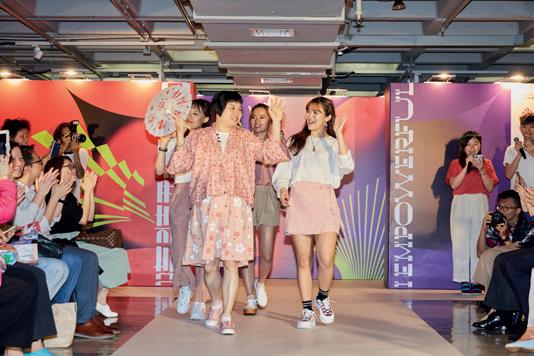
Subject: Engaging with Diversity
The service-learning subject is hosted by the Department of Applied Social Sciences. Working with groups who are often excluded by society, including schoolchildren from an ethnic minority background and people who are disabled or chronically ill, students engage in a variety of planned and spontaneous activities, including video shooting, online tutoring, and remote care service. Through these activities, students and the service targets both develop a deeper mutual understanding of how social inclusion and integration can be fostered in the Hong Kong society.
23
Engagement
Webinar for Ethnic Minorities in Hong Kong: COVID-19
In March 2022, the World Health Organization Collaboration Centre for Community Health Services, operated by the School of Nursing, hosted the webinar with presentation delivered by Professor Alex Molassiotis, former Director of the Centre and former Head and Professor of the School of Nursing. It aimed to provide ethnic minorities with a more thorough understanding of COVID-19 symptoms and the effects of the disease on the human body, and help ensure they have more equal access to up-to-date health-related knowledge.
Undergraduate Admissions Seminars for Students from Developing Countries
Organised annually by the Global Engagement Office, each seminar is tailor-made for a specific country including developing countries such as Kazakhstan, Indonesia, Ghana and Nigeria. These seminars provide an exclusive opportunity for prospective students to learn about PolyU, the admissions arrangements and entry scholarship packages. There is also a panel session facilitated by current students from developing countries on their experiences in preparing themselves for a successful study journey.
Policies and Operations
Cultural Ambassador Scholarship
The scheme was established in 2021/22 for non-local students of under-represented nationalities to further strengthen and enhance the University’s diverse undergraduate student body. Eight students from Brazil, Costa Rica, Jamaica, Myanmar, Saudi Arabia, Turkey and Venezuela were granted a one-off scholarship for the 2022/23 intake. Recipients will reach out to prospective students and their parents worldwide to promote PolyU and its undergraduate programmes.
Equal Employment Opportunity Policy
The University is committed to equal opportunity in academic pursuit and employment and to eliminating any form of discrimination against all staff members, students and other persons who have dealings with the University. No discriminatory acts against a person on the grounds of gender identity, breastfeeding, marital status, pregnancy, disability, family status or race will be tolerated by the University.
Campus Accessibility
All buildings on campus comply with the statutory regulations for “Buildings to be Planned for Use for Disabled Person”. Most buildings are accessible via ramps or lifts, which are also available to facilitate people with a disability or special needs to travel within campus. Improvements to access have been and will continue to be made to improve accessibility and safety.

5,345 Citation Count 376 Scholarly Output
2.13 FWCI
24

Research
SUSTAINABLE CITIES AND COMMUNITIES
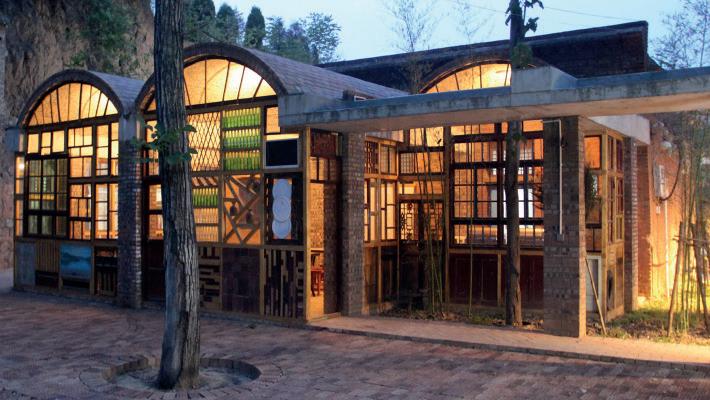
In-Situ Project
Professor Peter Hasdell, Associate Dean of the School of Design collaborated with other organisations on his research project which is a social design oriented interdisciplinary research platform project enabling and activating local conditions towards sustainable and participatory practices. The research, which empowers local and community ‘bottom-up’ capacities, is exemplified in three projects: Xianniangxi Community Kitchen and Village Square, House of Dreams, and Habibi Community Centre. House of Dreams has won significant international recognition and awards, including the UIA2030-UN Habitat Award (Paris) for sustainable material use. Since 2015, numerous community projects related to the In-Situ Project have benefitted thousands in Hong Kong, Mainland China and Iraq.
Healthy and Resilient City with Pervasive Localised Comfort Hubs
Led by Ir Professor Niu Jianlei, Associate Director of Otto Poon Charitable Foundation Smart Cities Research Institute, and Chair Professor of Building Environment and Energy at the Department of Building Environment and Energy Engineering, this project with HK$34.6 million in funding from the Research Grants Council, aimed to create outdoor localised comfort hubs (LoCH) in a high-density urban environment by employing a scientific microclimate design methodology in the early stages of building design. It is expected that thermal and wind comfort can be maximised and thermal
stress risk can be minimised, and that the same idea concept can also be applied to infill redevelopment projects and other property development to create LoCHs in existing neighbourhoods.
Jockey Club Operation SoInno’s Action Projects
Two transitional social housing design projects initiated by the PolyU Jockey Club Design Institute for Social Innovation received a Merit Award at the Green Building Award 2021, organised by the Hong Kong Green Building Council and Professional Green Building Council. The project “Transitional Social Housing — Ma Wan Old Village” aims to revitalise the old village into a diversified and vibrant community through introducing community development elements. The second project “Expandable Housing by Modular Integrated Construction (MiC)” proposes a versatile MiC building system prototype for Hong Kong which is fully relocatable, reusable and environmentally self-sustainable.
Landslide Recognition by Deep Convolutional Neural Network and Change Detection
A research team led by Professor John W. Z. Shi, Director of Otto Poon Charitable Foundation Smart Cities Research Institute and Chair Professor of Geographical Information Science and Remote Sensing
at the Department of Land Surveying and Geo-Informatics, has proposed a novel integrated approach, which combines a deep convolutional neural network and change detection, to identify landslides from remotely sensed images at higher speeds, contributing to the prevention and control of natural landslide hazards. Its effectiveness has been examined using two landslide-prone sites and, in addition to its high speed, an accuracy exceeding 80% was measured, demonstrating its high practicability.
Sustainability Initiative: Green Deck
The environment of the area around the Hung Hom Cross Harbour Tunnel has long been a major concern. Located in Hung Hom, the University is committed to finding a solution to address the environmental issues and revitalise the district. The proposed Green Deck, to be built over the existing plaza, would be a unique and innovative social project bringing long-term benefits, connecting the adjacent areas and forming a landscaped platform over the traffic. With funding from The Hong Kong Jockey Club Charities Trust, a study is underway with the objective of identifying and resolving critical technical issues and demonstrating that the Green Deck is technically viable.
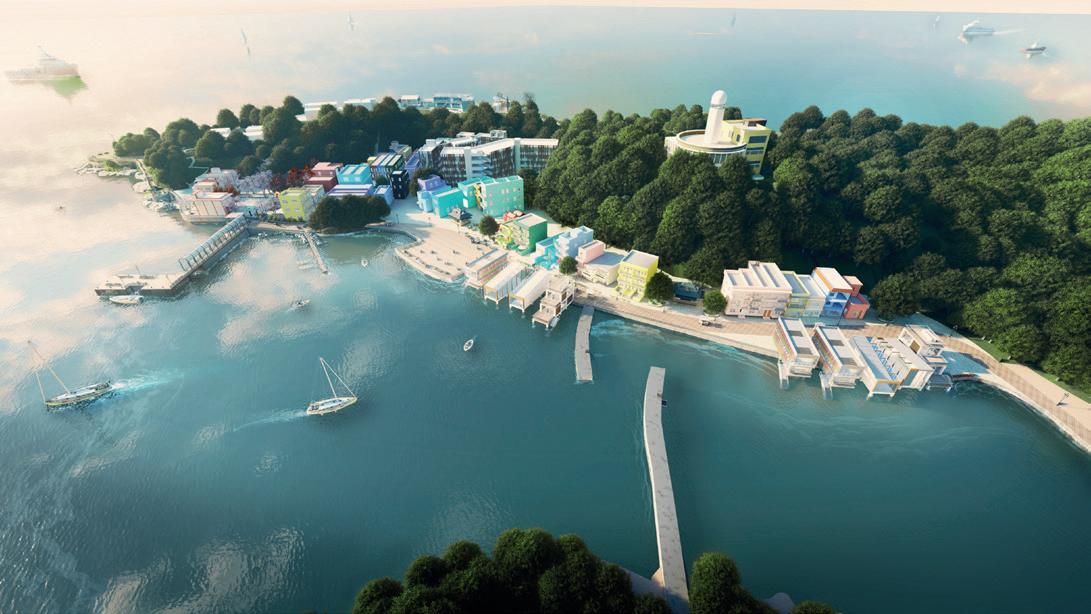
25
Engagement Education
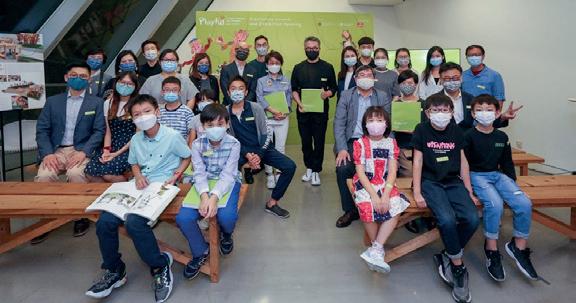
Subject: Science for Healthy and Sustainable Living Environments
Hosted by the Department of Building Environment and Energy Engineering, the subject aims to nurture an understanding among students of the principles of sustainable built environment; of the application of basic scientific methods and thinking to everyday experiences and global concerns; and of the environmental, financial, cultural and socio-economic challenges faced by underprivileged people in relation to their ability to achieve and maintain sustainable practices and a healthy living environment. Students visit grassroots families to learn about their living situation, especially with respect to energy efficiency and sustainability. They then use this experience to design related learning activities for primary or secondary school students.
“Playful Public Design by Children” Exhibition
In 2019, the Public Design Lab of the School of Design launched an inclusive design research project “Playful Public Design by Children”. Using the real-life setting of a Hong Kong country park, the project engaged a group of child art educators and over a thousand children together with their parents to study the inclusive design of country parks and participate in design projects, such as signage, whirly facilities, gazebos, and recycling bins design. In 2021, the Public Design Lab presented an exhibition showcasing the creative design and thinking process of the participants employing augmented reality and project videos.
Jockey Club Age-Friendly City Project Extension
Funded by The Hong Kong Jockey Club Charities Trust and hosted by the PolyU Research Centre for Gerontology and Family Studies, the project extension aims to sustain the achievements of the Age-Friendly City Ambassador (AFC) Scheme. To this end, ambassador training sessions have been organised to strengthen ambassadors’ knowledge and experience regarding an age-friendly city and to maintain the ambassador network. To promote integration of age-friendly city education into the formal curriculum, the project also collaborates with academics from five disciplines to plan and infuse project activities into their curricula so as to facilitate intergenerational interaction between AFC ambassadors and PolyU students.
Policies and Operations
Electric Vehicle Charging
As part of its drive towards sustainability, the University provides eight designated parking spaces in the campus car park equipped with semi-fast AC chargers and 37 designated parking spaces equipped with 13A socket EV chargers. The charging service is provided for use by PolyU staff and students with a valid parking permit and is free of charge. There is an online platform for users to check the availability of the chargers.
Pedestrian-Friendly Campus
To help provide a safe and environmentally friendly campus environment, the podium level of the campus is pedestrian prioritised, allowing staff, students and visitors to walk around the whole campus without worry. Linking the main campus and the podium level of Block Z, a footbridge improves pedestrian connectivity between the two campuses.
Service-Learning through Design and Building for Remote Communities
In this subject hosted by the School of Design, students undertake design and construction work for remote communities. Raising students’ awareness of social issues, challenges and needs in such communities, it aims to develop their creative thinking, cultural appreciation and social responsibility as they learn from local wisdom through studying and serving the communities. Related to conservation and preservation of traditional local culture as well as the existing fabric, architecture and natural environment through sustainable design, the subject culminates in a project where students make direct contact with villagers and apply design solutions to their specific needs.
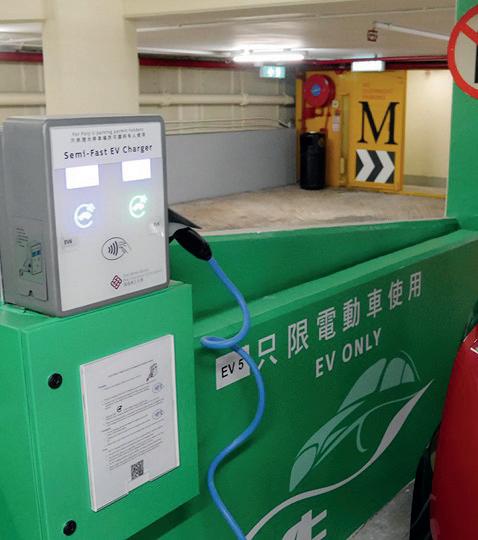
1,956 Scholarly Output
2.08
39,114 Citation Count
26
FWCI

Research
RESPONSIBLE CONSUMPTION AND PRODUCTION

Education
Subject: Sustainable Product Design
Hosted by the School of Design in collaboration with the Departments of Industrial and Systems Engineering and Mechanical Engineering, and with Swire Coca-Cola HK as an external partner, this subject aims to enable students to explore and practise product design with an understanding of broader social and ecological implications, thus equipping them to be sustainable design consultants.
In the 2021/22 academic year, students participated in a recycling plus upcycling design project, “Upcycling Design for Social Inclusion”. The retired bottle trays of Coke were given a second life by turning into new products like clothing tags for the visually impaired.
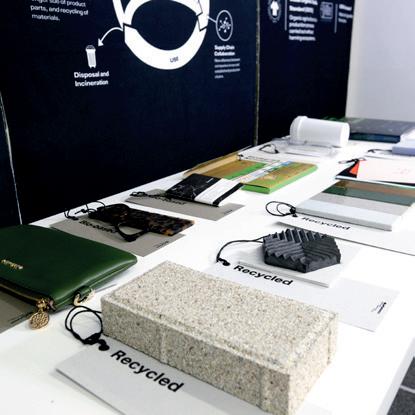
Eco-Friendly Moisture Absorbing Fabric
Professor Hu Hong, Professor of the School of Fashion and Textiles won a prestigious global innovation award at the TechConnect World Innovation Conference and Expo 2022 for his eco-friendly moisture absorbing fabric. The new fabric stands out from the existing moisture-absorbing fabric technology in that its fabrication is simpler, cheaper and more environment-friendly. By employing double-weft knitting technology, it only takes one single manufacturing process to produce the new fabric structure with its improved moisture-absorbing and sweat-releasing properties. The fabric also has inherent biological resistance, making it ideal for use in school uniforms and sportswear.
Suga Research Laboratory for Sustainable Urban Green Agriculture
The Suga Research Laboratory for Sustainable Urban Green Agriculture is Hong Kong’s first urban agriculture research platform. Employing innovative technologies, the Laboratory aims to develop the next generation of urban agriculture models for cultivating high-quality, safe fruits and vegetables in small indoor spaces. Research is being conducted to explore the optimal environmental conditions for crop growth, as well as systematic assessment and comparison of the food safety risk posed by harmful chemicals and food-borne bacteria found in vegetables grown from hydroponics and traditional farming.
Subject: You Can Make a Difference to Our Planet
Hosted by the Department of Applied Social Sciences and serving low-income families and individuals, this subject involves students in planning and implementing projects suggested by community partner organisations that address issues of social, economic and environmental sustainability. For instance, our students did home visits to provide lessons to secondary schoolkids in Kwun Tong, engaged in community education by setting up sustainable farming and “fish and vegetable symbiosis” experiments in their school, which allowed them to create impact in the community.

Engagement
Sustainable Material Corner Exhibition
Hosted by the School of Design and attracting 500 attendees, the Sustainable Material Corner Exhibition: Circularity was held in 2022.
Eco-friendly materials are now product staples, designed and manufactured by very many companies, some of whom have engineered their own material
recovery systems. Recognising the importance of this trend, the Material Resource Centre of the School of Design has collected sustainable materials from around the world and classified them in order to identify an optimal resource cycle. The exhibition served to provide visitors with information about the latest trends in sustainable materials.
27
Policies and Operations
Waste Disposal and Responsible Consumption on Campus
From policy setting to day-to-day operations, from architectural design to implementation, from research projects to academic programmes, PolyU embeds sustainability principles across all areas of its work and actively promotes a green culture.
In order to properly handle and responsibly dispose of waste generated on campus and to minimise the disposal of waste to landfills, the University has various policies focusing on waste management and green practices. These include those relating to green procurement, paper and straw use reduction, phasing out bottled water and minimising the use of disposables at University events. PolyU has been widely recognised in Excellent Level for Wastewi$e
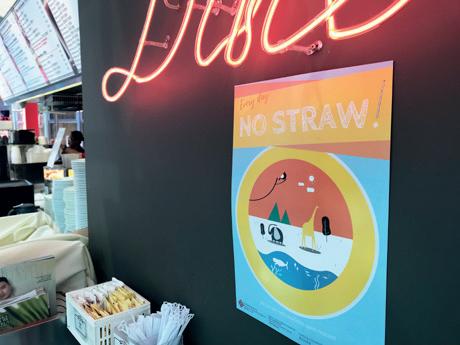

PolyU GreenCoin–A Fascinating Way to Green Your Campus Experience
As a platform to engage the University community in adopting a more sustainable lifestyle, the University has been operating the GreenCoin initiative on campus since 2019.
GreenCoin enables users to earn virtual coins for engaging in sustainability activities including recycling or Bring Your Own (BYO) practices. The coins can be redeemed for e-coupons for use on campus, such as for sports facility bookings, catering outlet dining and environmentally friendly souvenirs. Exclusive GreenCoin offers have also promoted redemption of selected plant-based items including candies, coffee and soap.
Recycling volume at reverse vending machine (RVM)
100,184
Reduction of municipal solid waste disposal to landfill (tonnes) (increased more than 85%) (compared to 2020/21)
180+
BYO practices
34,000
40,338 Citation Count 1,315 Scholarly Output
2.74 FWCI
28

Research
CLIMATE ACTION
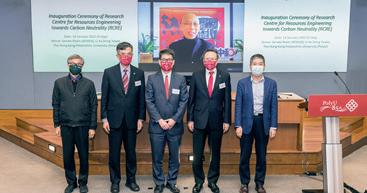
Research Centre for Resources Engineering towards Carbon Neutrality (RCRE)
The University is working towards the goal of carbon neutrality and the RCRE is at the forefront, not only for the University but also for the whole community. Focusing on resources engineering for carbon neutrality, it has established a strong track record and a recognised reputation in the waste management research community. Having been already commended
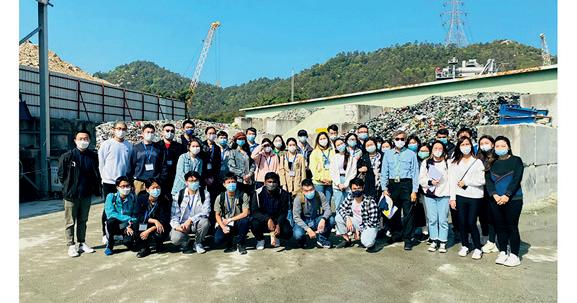
for its contribution in advancing the development of decarbonisation technologies and related policy study, the RCRE will spearhead further advances in this arena.
Study of Carbon Sequestration in Hong Kong’s Vegetation
Coordinated by Professor Charles Wong Man-sing, Associate Dean of the Faculty of Construction and Environment and Professor of the Department of Land Surveying and Geo-Informatics, the study is supported by a Research Grants Council funding amounting to nearly HK$5 million. As it is known that carbon stock and carbon sequestration of vegetation play a pivotal role in absorbing atmospheric carbon dioxide, the project proposes to use geospatial technologies to map and estimate the biomass and carbon sequestration of Hong Kong’s vegetation, by integrating satellite-, airborne- and ground-based remote sensing technologies.
Establishment of the Research Centre for Carbon-Strategic Catalysis (RC-CSC)
Established in June 2022, the Centre is the first research centre of its kind among Hong Kong institutions, serving as a platform for strengthening the University’s research collaborations to achieve more impactful outputs focusing on advanced catalyst design and synthesis for sustainable energy development strategies. The team, which includes professors of the Department of Applied Biology and Chemical Technology, the Department of Building and Real Estate, and the School of Fashion and Textiles, carries out in-depth explorations of catalysts and their applications in different chemical reactions related to multiscale energy conversion and supply systems, as the means to achieve carbon neutrality goals.
Education
Carbon Neutrality Gambit: Field Trip and Innovation Challenge 2022
In January 2022, the RCRE organised a three-day student event, focusing on a group competition and generating ideas about how Hong Kong might move towards a carbon-neutral future. Students went on a field trip to the environmental education centre named T-PARK and the Eco Block Manufacturing Plant, and attended sharing sessions hosted by the University’s professors focusing on carbon neutrality research. They later transferred their learning to develop and present their research ideas and strategies.
Service Learning: Building Green Communities with Environmental NGOs
Hosted by the Department of Management and Marketing, the subject aims to introduce students to conceptual and practical issues related to environmental policy and management, civil society and NGOs, business environmental responsibility, and collaborative environmental governance, as well as enhancing their awareness of civic duty and community needs. Students work as a team with an environmental NGO to deliver a project serving the communities in either Hong Kong or Mainland China in various formats, such as environmental education in the community, policy advocacy to address environmental challenges, design of corporate environmental initiatives to serve specific communities.
29
Engagement
Nurturing Energy Talent for Sustainable Living
To support sustainable power development, PolyU has again joined hands with the State Grid Corporation of China, Hongkong Electric and Xi'an Jiaotong University to launch the latest online “Belt and Road Advanced Professional Development Programme in Power and Energy” in 2021. The programme attracted 255 participants from 25 countries or regions to learn about the latest industrial practices and research findings related to tackling climate change, and had fruitful online interaction with speakers and other participants.
Policies and Operations
Green Campus
Being committed to a green built environment and one which is sustainable and low-carbon, PolyU is undertaking a series of campus development initiatives to create an environment conducive to driving its strategic development in education and research excellence. The University strives to integrate green features and innovative solutions from its research into campus development projects and, in this regard, has gained wide recognition and received many awards. In order to strengthen its work in this area, the University has recently formed the Campus Carbon Neutrality Committee to oversee implementation of campus carbon neutrality initiatives.

Roadmap to Achieving Carbon Neutrality on Campus
Leveraging techniques and innovative solutions from PolyU’s own research and as laid out in its “Roadmap to Achieving Carbon Neutrality on Campus”, the University aims for campus carbon neutrality by 2045. In the short and medium terms, the University targets reducing Scope 1 and Scope 2 carbon emissions (direct and indirect emissions mainly arising from use of fuel and purchase of energy) by 20% to 25% by 2028 and by 50% by 2033 (compared to the 2005/06 levels) respectively. In the long term, the University intends to achieve Scope 1 and 2 carbon neutrality by 2045, which is five years ahead of the Hong Kong Government's plan.
Direct and indirect carbon emission per capita (tonnes CO2e)
>30%
1.42
Reduced (compared to the peak level in 2014/15)
Carbon Neutrality Funding Scheme
The scheme was established in 2022 to support carbon neutrality research projects and the application of research outcomes on campus through close collaboration with the Campus Facilities and Sustainability Office and the Campus Development Office with a view to reducing the University’s carbon emissions.
746 Scholarly Output
2.64
22,037 Citation Count
FWCI

Research
LIFE BELOW WATER
Enhancement of Marine Biodiversity and Ecosystem Functioning along Lantau Eco-Shoreline
Led by Ir Professor Poon Chi-sun, Michael Anson Professor in Civil Engineering, Director of Research Centre for Resources Engineering towards Carbon Neutrality, Chair Professor of Sustainable Construction Materials, Head of the Department of Civil and Environmental Engineering, the project “Enhancement of Marine Biodiversity and Ecosystem Functioning along Lantau Eco-Shoreline with Low-pH Sea-Sand Seawater Eco-Engineered Seawall Panels” has received funding from the Lantau Conservation Fund of HK$2,269,000. This project aims to develop a novel low-pH eco-friendly concrete mix and then to create an eco-engineered and lighter panel on vertical seawall. Holes passing through the panels will provide habitats of marine species. Its effectiveness of biodiversity enhancement comparing with conventional concrete panels will be evaluated.

Education
Webinar about Clam Digging Activities
As one of the events on the Campus Sustainability Weeks, the online sharing was delivered by a conservation officer of the World Wildlife Fund (WWF)-Hong Kong, focusing on the ecological damage caused by clam digging activities by visitors to Shui Hau Wan on Lantau Island — an area rich in biodiversity. In addition to examining how this threatens the Shui Hau ecosystem, the WWF officer introduced a marine conservation project named “Environment and
Application of Satellite Imagery Technology for Marine Environmental Management
The Department of Land Surveying and Geo-Informatics has leveraged the University’s remote sensing technology to assist the Hong Kong Environmental Protection Department in carrying out a research study on the application of satellite imagery technology for marine environmental management of Hong Kong coastal waters. A set of new algorithms for the parameters’ retrieval and a pilot satellite imagery marine water quality monitoring system will be further developed.
Green Antimicrobial Agents and Textiles
Marine debris, including fragmented plastics, is responsible for causing marine pollution. One potential solution is the substitution of fossil-based plastics with degradable alternatives. Poly(lactide acid) / poly(hydroxy-butyrate) (PLA/PHB) is among the viable degradable options. Research conducted by a team from the Research Institute for Intelligent Wearable Systems and the School of Fashion and Textiles has led to the development of PLA/PHB fabrics using innovative bio-based and degradable PLA/PHB multifilament yarns. It is predicted that 100% degradation of PLA/PHB fabrics can be achieved in one to three and a half years, significantly shorter than for fossil-based plastics which can take hundreds of years, thus potentially contributing to the mitigation of marine plastic pollution.

Conservation Fund Sustainable Shui Hau Project”, with aims to maintain the ecological value of the area and encourage the sustainable use of coastal resources in the long term.
Educational Materials on Hong Kong Marine Life
Published by the Campus Facilities and Sustainability Office, “Green Tips” is a monthly educational e-flyer that focuses on information on a single green topic. It presents helpful and easily actionable ideas on how the
PolyU community can live an eco-friendlier lifestyle. In order to inform students and staff about the threats faced by marine life in Hong Kong waters and the world’s oceans and educate them how the natural marine habitats might be preserved, Chinese white dolphin and pollution of the oceans were among the featured topics.
31

Engagement
Modern Mariculture Demonstration Farm

With support from the Sustainable Fisheries Development Fund, the Research Institute for Future Food has set up a project promoting modernised and sustainable mariculture at a demonstration farm. It provides hands-on training and lectures to conventional mariculturists and those who intend to join the mariculture industry with a view to helping the local trade develop cutting-edge mariculture practices. To enhance the effectiveness of mariculture production and promote food safety of fisheries products, a Standard Operating Procedure and Hazard Analysis and Critical Control Point will also be developed for the target fish species with data acquired through culture trials.
Policies and Operations
Sustainability-Conscious Food Consumption in Official Entertainment
Demonstrating PolyU’s commitment to the promotion of green living and sustainability, the University pledged in 2017 to adopt sustainability-conscious food consumption practices for official entertainment functions. Food resources which are captured in ecologically unfriendly or unsustainable ways or have aroused international and local conservation concerns are excluded from official entertainment functions. Shark fin, bluefin tuna, humphead wrasse, wild-caught Hong Kong grouper, sturgeon caviar and black moss are examples of food items excluded.
Phasing out Bottled Water on Campus
Since 2017, in order to help conserve the marine environment by reducing the amount of plastic entering the oceans and breaking into small pieces harmful to marine life, the University has discontinued the sale of bottled water in any single-serving plastic bottle with a capacity of less than one litre in vending machines, the convenience store and catering outlets on the main campus and in hostels. Such single-serving bottles are also not offered at university activities and events.
405 Scholarly Output
1.95 FWCI
8,922 Citation Count
32
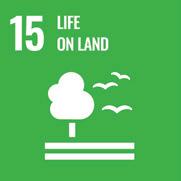
Research
LIFE ON LAND
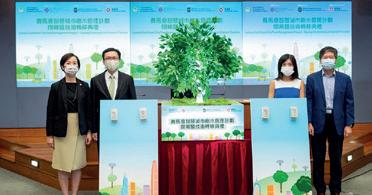
Smart Tree Management System
Professor Charles Wong Man-sing, Associate Dean of the Faculty of Construction and Environment and Professor of the Department of Land Surveying and Geo-Informatics, led the three-year “Jockey Club Smart City Tree Management Project” to develop the “Smart Monitoring System for Urban Tree Management”, with a grant of HK$32.8 million from The Hong Kong Jockey Club Charities Trust and support from various government departments and other local academic
and NGO collaborators. During the pilot project, smart sensors attaching to approximately 8,000 trees in Hong Kong provided data to identify those that needed to be timely examined, thereby facilitating urban forestry management.
Illegal Dumping of Construction and Demolition Materials
A project led by Dr Zhu Xiaolin, Associate Professor of the Department of Land Surveying and Geo-Informatics has been awarded a funding of HK$281,060 from the Hong Kong Government to investigate illegal dumping of construction and demolition materials. These materials can lead to destroyed wetland, landslide, clogging of waterways, breeding of germs and seizing of public lands. The project examines the scope of suspicious illegal dumping activities in Hong Kong and recommends an approach to deploying workforce for effective illegal dumping management. It not only contributes to the early detection of illegal activities but also to the assessment of recovery works after a site is damaged or destroyed.

Flash Droughts in South-East China
The research team led by Dr Wang Shuo, Associate Professor of the Department of Land Surveying and Geo-Informatics, has found that south-east China is at a higher risk of experiencing very rapid drying, with an increase of 18.67% from 2000 to 2020 in the proportion of flash droughts developing within five days. Based on the data using satellite soil moisture measurements, the study found that although flash droughts are generally not becoming more frequent, they are developing faster. Compared with more common and slowly developing droughts, flash droughts evolving with fast depletion of soil moisture may lead to an imbalance in ecosystems and agricultural systems.
Education
Subject: Ecotourism in the Community
The service-learning subject is offered by the School of Hotel and Tourism Management and involves students in promoting and enhancing ecotourism within local communities. Students are required to review potential resources for ecotourism development and maintenance, design promotional materials and branding, host activities to raise awareness of local cultures, and provide a comprehensive ecotourism marketing plan for the project site. Students also offer training to the local community in areas such as food safety and hygiene, basic English for communicating with tourists, nursing care for treating injuries, and service skills.
Subject: Understanding Ecocriticism through Environmental Movies
By means of watching Western wildlife films, Hollywood movie and animations, the subject, offered by the Department of Chinese and Bilingual Studies, aims to help students gain a deeper understanding of environmental issues; examine theories, concepts and major debates in ecocriticism; and develop their ecological awareness, sensitivity and core values towards animals, the environment, nature and society. It examines humankind’s relationship with animals, plants and other living species and focuses on cases of human dominance over and mistreatment of nonhuman species.
Webinar on Wildlife in Lantau
The webinar was held during the 2021 Campus Sustainability Weeks to provide students and staff with an exclusive opportunity to virtually explore the wonders of wildlife on Lantau Island in Hong Kong. Dr Xoni Ma, Founder and Education Director of Outdoor Wildlife Learning Hong Kong, engaged the participants in a lively and informative sharing of ideas and views about the wide variety of habitats on Lantau and the island’s conservation significance.
33
Engagement
International Webinar on Valorisation of Waste Incineration Residues in Construction
Since landfilling requires extensive land resources, the use of waste to energy (incineration) technology for managing non-recyclable solid waste has been gaining attention. In this regard, the webinar, organised by the PolyU Research Centre for Resources Engineering towards Carbon Neutrality and the International Society for Construction with Alternative Materials, was held in March 2022. Attracting more than 100 participants including worldwide renowned professionals and academics in the field of incineration residues management and featuring 13 presentations, it aimed to disseminate the latest state-of-the-art practice and relevant research studies.
Seminar on Wood Waste Conversion to Value-Added Products
At the seminar organised by the Department of Civil and Environmental Engineering (CEE) and the Hong Kong Institution of Engineers, Dr Leu Shao-yuan, Associate Professor of the CEE, explained the over-utilisation of woody products and generation of yard wastes that causes an environmental problem. Woody biomass can offer many physiochemical properties for valorisation, and Dr Leu introduced key characteristics of wood and some state-of-the-art techniques used to convert woody biomass into valuable products including construction materials, fuels and chemicals. With further recognition of wood’s value, it was expected that further research can help ensure the future of the circular economy of this green material, which has been used throughout human history.
Policies and Operations
Greening the Campus
Outdoor space on the PolyU campus not only provides connection between buildings, but also creates a pleasant and relaxing ambience for the University community and visitors. Careful and visionary landscape planning is therefore important. To strategically develop a pleasant campus landscape, PolyU formulated a three-year “Landscape Master Plan” in 2019, whereby a number of enhancement works are executed, including introducing new plants that complement the existing brick-red campus, and optimising the irrigation system.
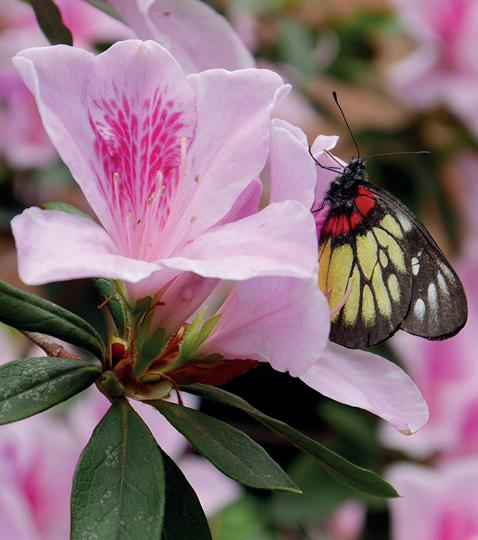
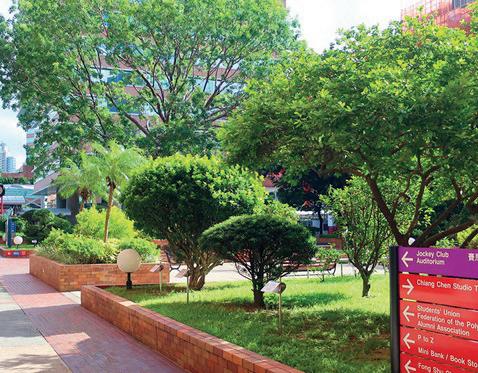
Biodiversity on Campus
Being committed to promoting biodiversity and strengthening ecosystems to benefit both the campus community and the natural world, the PolyU campus landscape features a mix of plant species, including seasonal flowers, shrubs and trees that enhance the environment and attract campus users. In order to improve campus user experience, TreeMap@PolyU and Fauna@PolyU serve as a web-based platform for mapping the locations of different tree and flower species. Users can also access pictures and basic information of each tree and flower species and some interesting stories behind them.
2.09
4,942 Citation Count
34
FWCI
183 Scholarly Output
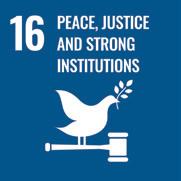
Research
PEACE, JUSTICE AND STRONG INSTITUTIONS

Education
Justice in a Social Context
The Department of Applied Social Sciences hosts some subjects focusing on justice in a social context. The subject “Justice and the Modern Social Context” compares different ways of thinking about justice and evaluates the links among moral reasoning, justice as a concept, social policy and administration, and the modern Chinese social context. Aiming to develop students’ critical thinking and analytical skills, another subject “Theories of Social Policy” examines the topic in relation to social policy and social justice.
Subject: Civil Society and Governance
Hosted by the Department of Applied Social Sciences, the subject aims to provide students with a basic knowledge of how civil society is linked to governance, and its historical development in local and global contexts. Being introduced to topics that include human rights and citizenship, students are expected to be able to examine emerging issues in the future development of civil society and governance, and clearly communicate their views.
Community Response and Government Policy Development in the COVID-19 Era
With community mobility restricted, lockdowns during the height of the COVID-19 pandemic had led to a radical change in the way Hong Kong institutions functioned, PolyU researchers of the Research Institute for Sustainable Urban Development, the Department of Civil and Environmental Engineering, and the Department of Land Surveying and Geo-Informatics examined the correlation between community mobility and government policy responses, discovering that government policy changes could predict the trend of COVID-19 infection cases. The government also communicated with the public responsively by organising nearly daily press conferences to disseminate information on the pandemic situation, and announced policy changes several days in advance. Therefore, behavioral changes of the public may occur before the policy enforcement.
Intimate Partner Violence Prevention
Analysing data from 7,466 households in Mainland China, researchers of the Department of Applied Social Sciences have developed the first age-specific and gender-specific prevalence estimates for different types of intimate partner violence (IPV) in Mainland China. With regard to sexual violence and severe physical assault, they revealed that most victims experienced unidirectional violence. Generally, physical assault and psychological aggression were found to be gender symmetric, but sexual violence between intimate partners to be gender asymmetric. The research highlighted the need to involve all genders in violence prevention and develop age-appropriate programmes.

35


Engagement
ICAC Ambassador Programme
With a view to engaging students in the promotion of integrity, the Independent Commission Against Corruption (ICAC) has launched the programme in collaboration with the PolyU Student Affairs Office. Students who are selected to be “ICAC Ambassadors” attend a leadership training programme hosted by the ICAC. With the knowledge and skills acquired from the training, they work as a team to organise a series of on-campus and online integrity promotion activities, with the aim of raising their fellow students’ awareness of integrity and anti-corruption.
Policies and Operations
Sexual Harassment Policy
PolyU is committed to creating a safe and inclusive environment, promoting equality and eliminating all forms of discrimination, including sexual harassment in the workplace, on campus, and at off-campus locations where university activities take place. The policy outlines procedures for informal resolutions and formal complaints, ensuring that allegations and complaints are being handled fairly and confidentially.
Anti-Corruption and Bribery Policy
Complying with the Hong Kong Prevention of Bribery Ordinance (Cap. 201), the University’s Anti-Corruption and Bribery Policy takes a zero-tolerance approach to bribery and corruption. All staff members are prohibited from soliciting or accepting any advantage without permission of the President or his delegate.
36 5.35 FWCI
Citation
329 Scholarly
19,281
Count
Output
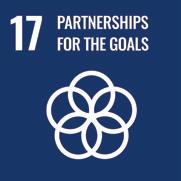
Research
PARTNERSHIPS FOR THE GOALS
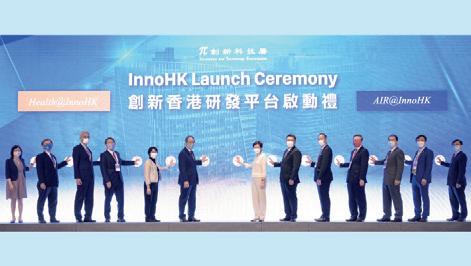
InnoHK Research Centres
InnoHK is a flagship innovation and technology initiative of the Hong Kong Government that aims to promote international research collaboration with a view to putting Hong Kong on the global advanced technology map. PolyU strongly supports this landmark initiative and, in partnership with world-renowned institutions, has established three world-class pioneering research centres under InnoHK, focusing on artificial intelligence, design and vision science technologies. Located in the Hong Kong Science Park, they are:
• The Laboratory for Artificial Intelligence in Design, established in collaboration with the Royal College of Art, UK;
• The Centre for Advances in Reliability and Safety, established with the University of Maryland, College Park, USA as the key research collaborator; and
• The Centre for Eye and Vision Research, established in partnership with the University of Waterloo, Canada.
Global Collaboration on Developing Fear of COVID-19 Scale
The spread of COVID-19 has led to fear worldwide. A team led by researchers of the Department of Rehabilitation Sciences, in collaboration with researchers from Iran, Sweden, and the UK, has developed the “Fear of COVID-19 Scale” to complement clinical efforts in treating COVID-19 and preventing its spread. The seven-item scale has robust psychometric properties, with scale items constructed based on an extensive review of existing fear scales, expert evaluations and participant interviews. Several psychometric tests have been conducted to ascertain its reliability and validity in assessing fear of COVID-19 among the general population. The scale will be useful in allaying COVID-19 fears among individuals.
Internationally co-authored papers: 74%
Collaborating countries which belong to low/lower-middle income group: 41%

National Partnership: Novel Rail Damper in Trial Use on Shenzhen Metro
The Modular Rail Particle Damper is a new rail damper developed by a research team led by Ir Professor Ni Yiqing (Yim, Mak, Kwok & Chung Professor in Smart Structures, Chair Professor of Smart Structures and Rail Transit at the Department of Civil and Environmental Engineering, and Director of the Hong Kong branch of the Chinese National Rail Transit Electrification and Automation Engineering Technology Research Centre) at PolyU. The dampers mitigate and control noise and vibrations in rail transit systems by using rail particle damping technology and an advanced machine learning algorithm. They were installed for trial use on a viaduct section of the Shenzhen Metro in January 2022, and will later be extended to other urban rail transit systems in Mainland China.
Local Partnership: Inspection Robot Improves Power Plant Maintenance
The University has established research partnerships with the Hong Kong Government, public organisations and NGOs to tackle critical issues related to its achieving SDGs. One of many such examples is the Department of Electrical and Electronic Engineering working with CLP Power Hong Kong Limited to develop an inspection robot that can work inside generators without the need to disassemble and reassemble their components, thus minimising the risk of damaging the components, shortening maintenance time and minimising the need for visual inspection. By deploying the robots, both the effectiveness and accuracy of generator inspection can be enhanced.
37
Education
Engaging
Students from PolyU and Member Institutions of University Social Responsibility Network (USRN) in Service-Learning
The Department of Computing and the Service-Learning and Leadership Office co-organised the “Digital Leadership and Social Responsibility” programme, which was open to students from PolyU and other USRN member institutions. The programme aimed to develop students’ global leadership capabilities and cultural sensitivity in the context of appropriate technology use in the digital age and enable them to demonstrate these competencies in practice by working in virtual teams on a PolyU service-learning project.
Global Classrooms Offer Internationalisation at Home for PolyU Students
To counteract the impact of COVID-19, which has forced the suspension of many internationalisation efforts including student exchange programmes, PolyU teachers have brought internationalisation to Hong Kong through the University’s Global Classrooms. By making innovative use of information technology, the physical and virtual learning environment has been expanded. In the past two years, Global Classrooms have been conducted with universities in Austria, Finland, Germany, Russia, South Africa, Spain, and the US. With students and teachers having been very positive about the experience, Global Classrooms will gradually become a routine part of on-campus programmes.
Postgraduate and Doctorate Programme Partnership

PolyU offers joint programmes ranging from master’s to doctoral levels in collaboration with a number of universities in Mainland China. One such example is the Master of Science in Disaster Nursing programme, developed in collaboration with Sichuan University and taught by The Sichuan University–Hong Kong Polytechnic University Institute for Disaster Management and Reconstruction. The programme, which aims to equip nurses based on the projected health needs of an affected community throughout the disaster management continuum, offers them the opportunity to develop the knowledge, skills and judgement necessary to function effectively as a practitioner, supervisor, collaborator, educator, manager, researcher and leader in a disaster-affected healthcare system.
38

Engagement
PARTNERSHIPS FOR THE GOALS
PolyU and NGOs Develop Innovative and Effective Intervention Services to Help Families Cope with Adversity
Since 2021, the University has partnered with local NGOs to enhance family resilience. The three-year collaborative project, supported by The Hong Kong Jockey Club Charities Trust, has resulted in initiatives that include an e-learning course and community programmes. The project exemplifies an emphasis on partnerships to address social issues, while highlighting the value of cross-sectoral partnerships in achieving SDG17 through developing educational resources, research and interventions to help Hong Kong families thrive amid challenges.

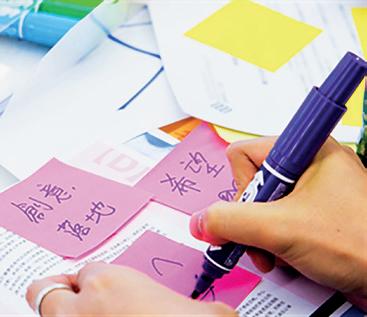
Partnership in “Grant for Good” Oxfam Hong Kong Poverty Alleviation Social Innovation
The PolyU Jockey Club Design Institute for Social Innovation was invited to jointly develop and deliver a unique social innovation and capacity-building programme in late 2021. Teams participated in a five-day workshop to improve their project planning and execution skills. The workshop combined the “Design Thinking” method commonly used in the social innovation sector and the concept of “Theory of Change”, which is familiar to many NGOs, to support eight teams aspiring to create poverty alleviation
projects and design new services. The planning toolkit was also designed to help aspirants in all sectors design and plan innovative poverty alleviation projects, and to be used in response to the actual needs for non-profit training, teaching, community development or research.
39


Policies and Operations
Cross Sectoral Dialogue about SDGs: University Social Responsibility Network (USRN)
The USRN was established in 2015, bringing together a group of thought leaders to exchange ideas, resources, and practices of varied scope and scale to steer global discussion and development of USR in higher education. The USRN now has 20 member institutions worldwide; PolyU is one of the founding members and Chair of its Executive Committee. Members work together to address global economic, social, cultural and environmental challenges with a view to making the world more just, inclusive, peaceful and sustainable. International USR Summit, webinars and global student engagement events were organised periodically.
The Hong Kong Sustainable Campus Consortium
Established in 2010 by the HKSAR Heads of Universities Committee, it provides a platform to information and best practices sharing on sustainability-related issues among the eight publicly-funded universities in Hong Kong including PolyU. The Consortium is also accountable for the Hong Kong Declaration implementation and result reporting on environmental performance indicators adopted by the higher education sector. PolyU convened the Consortium and chaired the executive committee in 2022.
40
Published by the Institutional Planning and Analytics Office Contact Information The Hong Kong Polytechnic University Hung Hom • Kowloon • Hong Kong (852) 2766 5111 www.polyu.edu.hk T W
 The Hong Kong Polytechnic University supports the Sustainable Development Goals
The Hong Kong Polytechnic University supports the Sustainable Development Goals






























































































